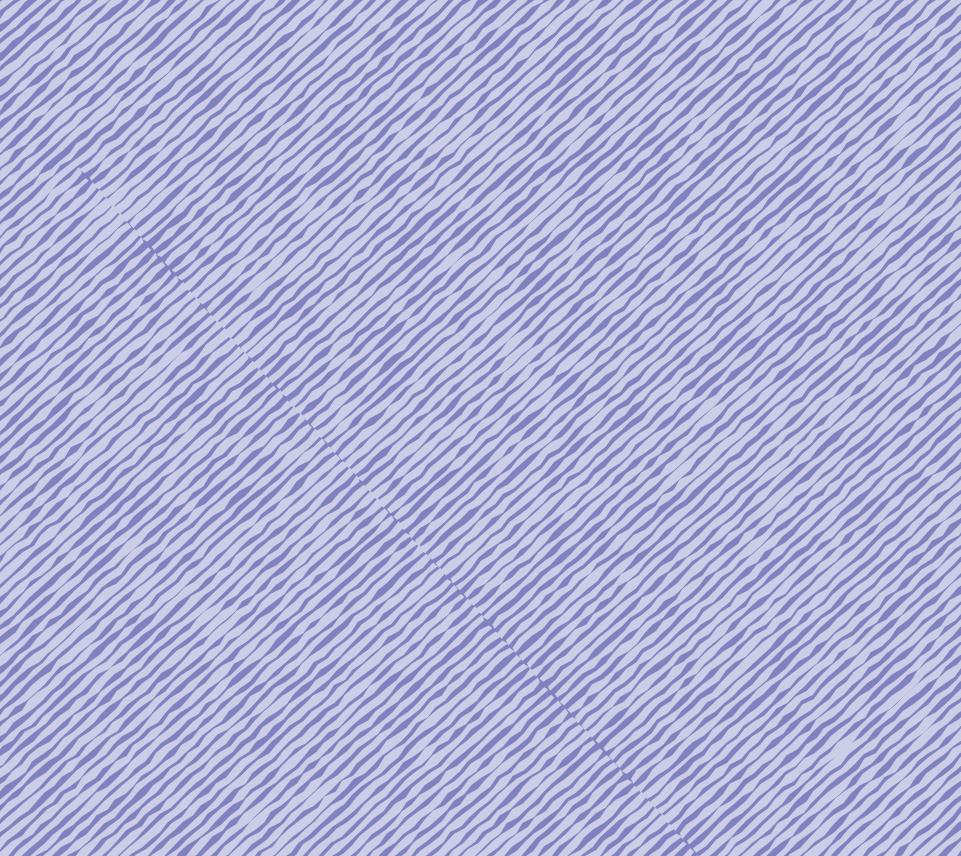



ISSUE 1488 OCT 22ND '22 ג"פשת ירשת ז"כ PARSHAT BERESHIT - SHABBAT MEVARCHIM ה"ב OU ISRAEL 02-560-9100 | TorahTidbits.com | ADVERTISING 02- 560-9125 תישארב תשרפ YERUSHALAYIM IN/OUT TIMES FOR SHABBAT PARSHAT BERESHIT CANDLES 5:25PM • HAVDALA 6:37PM • RABBEINU TAM 7:17PM םיקלא ארקיו ךשחלו םוי רואל הליל ארק ה :'א תישארב Yearly Zmanim Inside!see page 37 In His Image Rabbi Judah Mischel Mashpiah, OU-NCSY Executive Director, Camp HASC page 52 New Weekly Column! From the Desk of Rabbi Moshe Hauer OU Executive Vice President page 6
Moshe Hauer
Aliya By Aliya Sedra Summary
Reuven Tradburks
Favoritism?”
Dr. Tzvi Hersh Weinreb
Shmuel Goldin
HaShishi
Azarya Berzon
of Listening
Lord Jonathan Sacks
The Prophets
Nachman
Tale of
This
OU Israel Schedule
In His Image Rabbi Judah Mischel
Simchat Shmuel Rabbi Sam Shor
The First Battle for Yerushalayim Rabbi Moshe Taragin
In the Beginning – of What? Menachem Persoff
Going To And From An Aliya Rabbi Daniel Mann
Growth Rings of the Fruit Tree Rabbi Aaron Goldscheider
OU Israel Parenting Column Dr. Ethan Eisen
Activities and Hefker In My Garden During The 8th Year Rabbi Moshe Bloom
The Y- Files Weekly Comic Netanel Epstein
4 Teens By Teens
Goldsmith
Zach
Tidbits cover image!
Photo By: Daniel Santacruz, Maale Adumim I made aliyah 10 years ago from Teaneck, New Jersey What does the picture mean to you? The Churva synagogue, an architectural gem in Jerusalem’s Old City, has withstood attacks and neglect, and it's a living example of the revival of Israel's capital.

2 TORAH TIDBITS 1488 / BERESHIT 5783 Table of Contents
week's Torah
04Dear Torah Tidbits Family Rabbi Avi Berman 06Prioritizing Character Rabbi
08
Rabbi
14“Undeserved
Rabbi
18Is it Good? Rabbi
20Yom
Rabbi
24The Art
Rabbi
zt"l 30Probing
Rabbi
Winkler 32A
Two Sins Rabbi Shalom Rosner 34Tantalizing Truth Rebbetzin Shira Smiles 37Yearly Zmanim Centerfold 44
52
54
56
60
66
68
70
72Agricultural
74
76Torah
Moriah
//
Tobin New Weekly Column! Guest Column! Shabbat Mevarchim םיקלח 7 ו תוקד 44 ,9 העשב ישילש םויב היהי ןושחרמ שדוח דלומ הבוטל לארשי לכ לעו ונילע אבה יעיבר םויבו ישילש םויב היהי ןושחרמ שדח שאר Two days of Rosh Chodesh are celebrated on Tuesday and Wednesday (Oct. 25,26)
5:41 6:315:346:38Netanya5:41 6:325:356:39Be’er Sheva5:42 6:325:346:38Rehovot5:42 6:315:186:38Petach Tikva5:25 6:305:336:37Ginot Shomron5:40 6:305:236:37Haifa / Zichron5:30 6:295:326:36Gush Shiloh5:39 6:325:346:38Tel Aviv / Giv’at Shmuel5:41 6:305:336:37Giv’at Ze’ev5:40 6:315:346:37Chevron / Kiryat Arba5:41 6:335:366:39Ashkelon5:43 6:325:346:38Yad Binyamin5:42 6:285:256:35
Tzfat / Bik’at HaYarden5:33 6:285:306:34Golan5:38 Rabbeinu Tam (J'lem) - 7:17PM • next week - 7:10pm
JERUSALEM
Ranges 11 days Wed - Shabbat Oct. 19-29 / 24 Tishrei - 4 Marcheshvan
Earliest Tallit and Tefillin 5:54 - 6:01
Sunrise 6:45 - 6:53
Sof Zman Kriat Shema 9:34 -9:37

Magen Avraham 8:58 - 9:01
Sof Zman Tefila 10:31 - 10:32
(According to the Gra and Baal HaTanya)
Chatzot (Halachic Noon) 12:23 - 12:22
Mincha Gedola (Earliest Mincha) 12:53 - 12:52
Plag Mincha 4:51 - 4:53
Sunset (Including Elevation) 6:07 - 5:57
Seymour J. Abrams • Orthodox Union Jerusalem World Cen ter • Avrom Silver Jerusalem College for Adults • Wolinetz Family Shul • Makom BaLev • Birthright • Yachad • NCSY in Israel • JLIC in Israel • Pearl & Harold M. Jacobs ZULA Out reach Center • The Jack Gindi Oraita Program • OU Israel Kashrut

ZVI SAND, PRESIDENT, OU ISRAEL Yitzchak Fund, Former President, OU Israel Rabbi Emanuel Quint z”l, Senior Vice President | Prof. Meni Koslowsky, Vice President VAAD MEMBERS: Dr. Michael Elman | Stuart Hershkowitz | Moshe Kempinski | Sandy Kestenbaum | Harvey Wolinetz
RABBI AVI BERMAN, EXECUTIVE DIRECTOR, OU ISRAEL David Katz, CFO, OU Israel | Chaim Pelzner, Director of Programs, OU Israel | Rabbi Sam Shor, Director of Programs, OU Israel Center Rabbi Sholom Gold, Dean, Avrom Silver Jerusalem College for Adults 22 Keren HaYesod <> POB 37015 <> Jerusalem 91370 phone: (02) 560 9100 | fax: (02) 561-7432 email: office@ouisrael.org website: www.ouisrael.org
Founders and initial benefactors of the OU Israel Center: George and Ilse Falk a"h

Torah
JERUSALEM MUNICIPALITY
OU Israel, Torah Tidbits does not endorse the political or halachic positions of its editor, columnists or advertisers, nor guarantee the quality of advertised services or products. Nor do we endorse the kashrut of hotels, restaurants, caterers or food products that are advertised in TT (except, of course, those under OU-Israel hashgacha). Any "promises" made in ads are the sole responsibility of the advertisers and not that of OU Israel, the OU Israel Center , Torah Tidbits.
OU ISRAEL CENTER 3
AND HAVDALA TIMES CANDLE LIGHTING OU Kashrut NCSY Jewish Action JLIC NJCD / Yachad / Our Way OU West Coast OU Press Synagogue/Community Services OU Advocacy OU Israel MOISHE BANE, PRESIDENT OF THE ORTHODOX UNION Mitchel Aeder, Chairman of the Board, Orthodox Union | Esther Williams, OU Israel Chair | Gary Torgow, Chair, OU Kashrus Commission RABBI MOSHE HAUER, EXECUTIVE VICE PRESIDENT Rabbi Joshua M. Joseph, Ed.D. Executive Vice President & Chief Operating Officer | Rabbi Dr. Tzvi Hersh Weinreb, Exec. V.P. Emeritus | Shlomo Schwartz, Chief Financial Officer | Lenny Bessler, Chief Human Resources Officer OU KOSHER: Rabbi Menachem Genack, CEO/Rabbinic Administrator OU Kosher | Rabbi Moshe Elefant, COO/Exec utive Rabbinic Coordinator ISRAEL: Rabbi Yissachar Dov Krakowski, Rabbinic Administrator | Rabbi Ezra Friedman, The Gustave & Carol Jacobs Center for Kashrut Education/Rabbinic Field Representative Headquarters: 11 Broadway, New York, NY 10004 212-563-4000 website: www.ou.org Editor Emeritus: Phil Chernofsky Editor: Rabbi Aaron Goldscheider | aarong@ouisrael.org Advertising: Ita Rochel | 02-5609125 or ttads@ouisrael.org Website: www.torahtidbits.com Not getting enough TTs? Too many? None at all? Contact our DISTRIBUTION 050-577-2111 • ttdist@ouisrael.org
Tidbits and many of the projects of OU Israel are assisted by grants from THE
OTHER Z'MANIM TImes According to MyZmanim (20 min. before sundown in most cities, 40 min. in Yerushalyim and Petach Tikva, 30 min. in Tzfat/Haifa) NOACHHAVDALABERESHITCANDLES HavdalaCandles6:37Yerushalayim / Maale Adumim5:25 6:305:18 6:335:366:39Aza area (Netivot, S’derot, Et al)5:43 6:315:366:38Beit Shemesh / RBS5:43 6:315:336:37Gush Etzion5:40 6:315:346:38Raanana/ Tel Mond/ Herzliya/ K. Saba5:41 6:315:346:37Modi’in / Chashmona’im
DEAR TORAH TIDBITS FAMILY
RABBI AVI BERMAN Executive Director, OU Israel

In high school, my best friend Avraham took upon himself to volunteer with the Ethiopian community who had just arrived in Israel and were placed in two absorption centers built for them in Chulda and Bat Chatzor. He went numerous times a week to run pro gramming, help out with the children, and be a friendly face to the new Olim. It was evident that the Ethiopian-Israeli commu nity was a major part of his life. He asked me to join him numerous times to volunteer and spend Chagim at the absorption center. I remember Simchat Torah there – bringing Simcha and dancing with the new Olim.
Seeing the love, passion and connection he had with this community was admira ble. It came from an understanding that he saw Jews coming back from exile and the necessity for those of us already in Israel to welcome them and help integrate them into the State of Israel.
It came as no surprise that he married a young woman, Devora, from the Beita Yis rael Ethiopian-Israeli community who made Aliyah in 1984 during Operation Moses. To this day, he and I and our wives are very close friends. I will never forget the Shabbat they came to us when Devora spent 4 hours all Shabbat afternoon telling over her family’s story about how they left Ethiopia. She was nine years old at the time, and she described walking from Ethiopia to Sudan, spending many months in the Sudan desert. She shared
the many challenges they faced, including getting robbed, being able to travel only at night, not having water, and unfortunately losing family members who died on the way. Then, finally boarding planes to Israel without knowing what planes were before.
At the time, my oldest child was 12 and youngest was three. I recall them sitting with their jaws down to the floor listening to this incredible story that happened decades ago to our family friend. They couldn’t have otherwise imagined such a story happening in this day and age. When they had no idea what a plane was, people we knew were fly ing back and forth from N. America to Israel for visits and the Chagim.
After that Shabbat, I felt so blessed that my children and I had the opportunity to hear her tell her story. I remember telling myself this was an incredible opportunity to see a Yetziat Mitzrayim (Exodus from Egypt) of our generation.
Fast forward a number of years…I was plan ning my weekly radio show with Rav Shmuel Eliyahu on Galei Yisrael. We were preparing the Erev Pesach show and discussing how to connect people to the Exodus. While Yetziat Mitzrayim was over 3,000 years ago, we still have Yetziyot Mitzrayim in our generation. We decided to interview Devora who shared her story in approximately half an hour on the radio. I received endless feedback from people who were touched by her story.
Overall, the members of the Ethiopian-Is raeli community are very close-knit. They are
4 TORAH TIDBITS 1488 / BERESHIT 5783
community oriented and as one could imag ine, stay very close to those who they made Aliyah with. Ethiopian-Israelis serve as Rabbis, members of the Knesset, judges, IDF officers, business leaders, etc. They are having a tre mendously positive impact on Israeli society. When Chaim Pelzner (OU Israel Program Director) approached me about creating a board game that shows the Ethiopian com munity’s Aliyah to Israel, including their struggles and triumphs, I thought this would be a tremendous opportunity to showcase this Yetziyat Mitzrayim of Operation Moses and Operation Solomon. He had an incred ible idea, which he and his staff worked on over the course of several years – a board game called Guzo – that provides tremendous insight into Ethiopian Aliyah.
Each player’s character is a different fam ily member. The game is full of excitement and trivia. Chaim and his team spent endless hours working on the game and having it reviewed for accuracy by Devora and other Ethiopian-Israelis. The game is dedicated to the thousands of Ethiopian Jews who didn’t make it and died on their way to Israel.
We have been sharing the game with leaders and edu cators, including copies I gave to Rav Shmuel Eliyahu and Mayor Moshe Lion. Over Suk kot, I had the chance to play Guzo with my family and our Chag guests (a former Vancou ver NCSYer and her family). Adults and children alike learned an incredible amount of insights and knowledge –getting a glimpse into their
story, challenges, and customs. Playing inside the Sukka in Eretz Yisrael gave added mean ing. Here we were sitting in a Sukka playing an educational game illustrating how the Ethi opian Jews walked across the desert as part of their Yetziyat Mitzrayim. What a beautiful way to show the yearning Jews had to come back to Israel from around the world.
I want to commend Chaim and the rest of the team who worked on this incredible game. It is currently available in Hebrew. You can learn more about Guzo and purchase it here: https://www.ouisrael.org/games. Praying for the complete Kibbutz Galiyot (gathering) of Jews from all over the world and Binyan Beit HaMikdash (building of the Temple) very soon.
Wishing you all an uplifting and inspiring Shabbat,
 Rabbi Avi Berman Executive Director, OU Israel aberman@ouisrael.org
Rabbi Avi Berman Executive Director, OU Israel aberman@ouisrael.org


OU ISRAEL CENTER 5
GET A PROFESSIONAL VISION EXAM 02-674-3888 FREE exam with purchase USING THE MOST ADVANCED DIAGNOSTIC EQUIPMENT Multifocal Experts Contact lens fittings Satisfaction guaranteed! • Wide selection of beautiful frames You Deserve a Professional Vision Exam Please call for an appointment
Macabi and Meuchedet benefits
FROM THE
OF
RABBI MOSHE HAUER
OU Executive Vice President
OU Israel's Torah Tidbits is proud to welcome to our weekly publication Rabbi Moshe Hauer, the Executive Vice President of the Orthodox Union. It is a true honor and zechus that through this initiative Rabbi Hauer’s wisdom and Torah insights will be disseminated to tens of thousands of Jews here in Israel and to Jews across the world.
Bruchim Habaim to the pages of Torah Tidbits!
- Rabbi Aaron Goldscheider, Editor

Prioritizing Character
“Let us make man in our image.”
This verse presents an obvious diffi culty as it implies a plurality of creators. Rashi (1:26) addresses the issue using the Midrashic approach that G-d was in fact addressing His heavenly court of angels:
Although they did not assist Him in form ing him (the man) and although this use of the plural may give the heretics an occa sion to rebel (i. e. to argue in favor of their own views), yet the verse does not refrain from teaching proper conduct and the vir tue of humility, namely, that the greater should consult, and take permission from the smaller; for had it been written, “I shall make man”, we could not, then, have learned that He spoke to His judicial council
but to Himself. And as a refutation of the heretics it is written immediately after this verse “And God created the man”, and it is not written “and they created” (Bereishis Rabbah 8:9)
Note the dramatic implication of this choice. G-d had two choices: He could have written “I will make man,” which would have avoided any issues of heresy, but missed an opportunity to teach proper con duct and humility, or He could have written “Let us make man,” to teach character but potentially open the door to heresy. G-d chose the latter.
Both Rav Nosson Tzvi Finkel, the Alter of Slobodka and Rav Yaakov Moshe Charlap of Yerushalayim saw in this choice a critical value statement: Teaching good character provides the ultimate assurance that we will maintain our proper faith. The same cannot be said for a clear theology that remains silent on matters of character. G-d created man with a message: Good character, derech eretz, is the foundation of our faith.
In memory of Meni’s mother
Yiska Leah Koslowsky a"h
in memory of Sandy’s father Naftali Lieman z"l
their Neshamot have Aliyot Meni & Sandy Koslowsky
6 TORAH TIDBITS 1488 / BERESHIT 5783
DESK
ירשת בי And
ירשת בי May
EXCITING NEW PROJECTS: Presales, Under Constructions, Ready to Move In. Works with your cash
ow!! Call for more information

JERUSALEM SALES
BUILDINGS and VILLAS:
In the most desirable locations!
Opportunities for you to purchase buildings with building rights that will give you the sqm you need for yourself and with family/friends!!
RECHAVIA
2 Bedrooms, 1st
oor, Shabbat elevator, wrap around balcony, needs renovation, currently rented out. NIS 3,500,000.
BAKA Arab style 5.5 room apartment, 155 sqm + 200 sqm garden in use, private entrance, MB ensuite, high ceilings
GERMAN COLONY - In a small building
Spacious 2 bedrooms, 80 sqm, 1st
oor, light bright and quiet, balcony. NIS 3,550,000.
OLD KATAMON
* In a small building, 125 sqm, private entrance, 3 exposures, Excellent potential, NIS 4,300,000!
* 5 Bdrms, 135 sqm spacious duplex, succah, private elevator.
CITY CENTER
New building - 4 bedrooms, 128 sqm, balcony, central A/C, storage room, parking, 2 elevators, Open view! NIS 5,200,000
OLD CITY
Magnicently renovated 8+ room home with open view to Har Habayit! Perfect for a residential home and investment!
HAR NOF
* NEW ON MARKET! Centrally located! 4.5 rooms, low
oor, elevator, MB en suite, succah, ,machsan, Immediate NIS 2,800,000
* SHLAV A - 170 sqm duplex garden apt. , open view, NIS 5,000,000!!
* SHLAV A - 4 bdrms, renovated, spacious LR DR, succah, NIS 3,500,000!
* SHLAV B - 200 sqm duplex apartment, beautiful kitchen, wrap around garden.
FOR MANY MORE PROPERTIES:
OU ISRAEL CENTER 7 Eiferman Properties Ltd. 02-651-4030
VISIT OUR NEW WEBSITE www.eifermanrealty.com
ALIYA-BY-ALIYA SEDRA SUMMARY
Rabbi Reuven Tradburks Director of RCA Israel Region

The last parsha of the Torah covers less than a day – the first parsha in the Torah spans 1000 years.
Parshat Breishit covers creation, Adam and Eve in the Garden of Eden, Cain’s mur der of his brother Abel, and the generations concluding with Noah and the impending destruction of all but Noah and his family. 1st aliya (Genesis 1:1-2:3) The world was created in 6 days: light, heavens, earth amidst seas, vegetation, sun, moon and stars, birds and fish, animals. And finally, man. Man is blessed to be fruitful and multiply, to sub due the world and to rule over the animals. The world was completed and the creation ceased on the 7th day.
The Creation is a progression, an evolutionary progression, from less sophis ticated to the most sophisticated. It begins with inanimate earth, water, heavens,
then gets filled with vegetation, then living beings of fish and birds, then land animals. And finally, man.
While we are quite familiar with the expression that man is created in the image of G-d, it is, as Rabbi Sacks coined, “Radical Then, Radical Now”. Man created in the image of G-d? That is a shocking expres sion.nBut after we get over the shock, it is a fantastic mandate. As if to say, G-d is Creating a partner, a shadow of Himself. Man is not a fancy ape, a well-developed baboon. While man shares characteristics with animals, the difference is a chasm; the image of G-d. Man is majestic.
This is why we include Shabbat in the Creation story. He stops. We begin.
Where He stops is where we begin. In ceasing, He was passing the keys over to man. This is a crucial principle of Judaism: on the sixth day G-d said to man “You take over – rule the world and subdue it” and then to prove it, He rested on the seventh, as if to say, “I mean it – you are my partner – take over.”
The Midrash makes that point – the para graph of V’yachulu ends with “la’asot”. It does not end like all the other 6 days – it was evening and it was morning, the sev enth day. It says G-d ceased to do. He ceased to do – now it is your turn to do.
The Torah’s view of man is majestic,
Rottenberg
On her 5th yahrzeit - 17 Tishrei
Mark & Livia Rottenberg Shopsy & Miriam Kanarek
8 TORAH TIDBITS 1488 / BERESHIT 5783
KI TEITZEII
BERESHIT Condolences to Adele Muskin, Muskin, Wilk and Chamudot families on the passing of Rav Tuvia Muskin z"l ל"ז ןבואר רזעלא ברה ןב היבוט בר םילשוריו ןויצ ילבא ראש ךותב םכתא םחני םוקמה תומשנ יוליעל ל"ז ריאמ תב המיס לידנייש Sonia
z"l
ennobling, empowering, G-d like, regal. 2nd aliya (2:4-20) A more detailed account of the Cre ation of Man: G-d creates man from dust of the earth and breathes into his nostrils the breath of life. He is placed in the Garden of Eden, full of beautiful trees, to work it. He commands him not to eat of the tree of knowledge or of life. And declares that it is not good for man to be alone; I will make him a partner.










The language of chapter 2 is in striking contrast to chapter 1. This creation of man is more like a novel than a science book. Personality, morality, humility, emotion. Chapter 1 is the creation of mankind –chapter 2 is the creation of a person. Adam is created from the adama, the earth, a rather humble beginning. He is created alone. That is not good. He is given a com mand. There is good and evil. He is to work the garden, not rule it. The animals are brought to him to name.
This is the beginning of man understanding who he is and who he is not. He is created in the image of G-d, charged with being a partner by G-d. But he is not G-d Himself. He is to rule the world, as He Rules. He is to name the animals, as G-d named the day, night, heavens and seas. As He is a Creator, man is to be a creator – a creator of life through children, a creator of vegetation through the garden. On the other hand, it is not good that he is alone – for there is only One who is Alone. G-d is the Commander;
OU ISRAEL CENTER 9
True wholesaler from the diamond boursa with over 25 years experience member diamond dealers club Engagement Rings ∙ Stud Earrings Pendants ∙ Tennis Bracelets 050-573-9061 jeffmor36@gmail.com www.JeffMorDiamondJewelry.com Condolences
to the family of Goldie Gross a"h on her passing
םילשוריו ןויצ ילבא ראש ךותב םכתא םחני םוקמה
he, the commanded. Man is to be G-d like, to be creative, to be a namer of things, to take his place as the guardian of the world. But how far he goes and how far He goes is the topic of the 3rd aliya.
3rd aliya (2:20-3:21) Woman is created. The serpent convinces Eve that were she to eat of the forbidden fruit, she would be as G-d, know ing good and evil. She and Adam eat of the fruit and their eyes are opened and they cover themselves with fig leaves. They hide from G-d, Who challenges their disobedi ence. All are punished – the serpent will slither, the woman will birth children with pain, and man’s cultivation of the earth will be with sweat.
A richer story of symbolism in Tanach is hard to find. A speaking serpent, the entice ment of beauty, hubris, failure, hiding from G-d, blame, consequences. Many and varied are the lessons to be culled from this story.
Man, created in the image of G-d, must aspire to his lofty calling, while remembering he is but the image of, not G-d Himself. The serpent convinced Eve, and then she
the Torah learning from this issue of Torah Tidbits be
Adam, that man may be the determiner of good and evil. The serpent convinced them: as G-d cedes to man leadership in this world, He likewise cedes to man the role as legislator of good and evil. In that they err. And G-d responds by walking them back a bit in their most creative activities, as if to say that while you are creators, I remain the Creator. Eve, when you create and bear children, the quint essential creative moment of humanity, it will be with labor, a reminder of your earthly origins. And man, when you cre ate from the earth, it will be with sweat. There is only One who Creates with the uttering of a word, with ease. He is the Creator; you, a creator. And He is the Com mander of what is good and evil, while you are the commanded.
4th aliya (3:22 – 4:18). Man is exiled from the Garden of Eden. Cain and Abel are born. They bring offerings to G-d – Abel’s accepted, Cain’s not. Cain kills Abel. “Am I my brother’s keeper?” Cain is consigned to wander the earth.
Sin is met with exile. Adam’s sin brings exile from the Garden of Eden. Cain’s sin brings wandering, homelessness. The Torah explains the meaning of exile: Cain left from being before G-d. This introduces a pillar concept of man and G-d. Divine
first
Greatly missed by his children, grandchildren and great grandchildren Debbie & Howard Ross, Francesca & Iain Miller, Honey & Benyo Lipnick and Darren & Michal Manasseh
10 TORAH TIDBITS 1488 / BERESHIT 5783
May
תמשנ יוליעל Joseph (Joe) Manasseh z"l ל"ז הקותעמו השנמ לאירבג ןב ףסוי 0n his
Yahrzeit ירשת ט"כ
In loving memory of our dear mother DORIS KRAUTHAMER a"h on her first yahrzeit
A year has passed and we miss you so much Daniella and Moti Krauthamer and families
disfavor with man results in distance. Adam was sent away from the Garden. Cain sent away from being before G-d. Later, the tower of Babel will bring dispersion. Only Avraham will reverse this and journey not away but toward a specific place. 5th aliya (4:19 – 4:22) Lemech and his wives Ada and Tzila bear children. One is the initia tor of animal husbandry, one of the music of strings and wind instruments, and one of the fashioning of copper and iron.









A curiously short aliya. Mankind advances marvelously in creatively mastering the world: the mastery of animals, creative artistic expression of music and advanced productivity of copper and iron. But, while man is masterful in his creative conquest of the world, the brevity of mention is to highlight that of much greater importance is his mastery of himself. The Torah is far more interested in man’s ethical behavior and his relationship with G-d than with his mastery of iron and the creative expression of his music. He is mighty good at mastery of the world. Let’s see how good at mastering himself.

continued on next page...
In a good area in the Moshava - 2-story garden apartment, 200m + 190m garden, in Tabu, has great potential, parking, storage, for renovation. Asking 8.2 million NIS
In a good area in the Moshava2 apartments (can be connected), 1st floor, 170m, renovated, Sukkah porch, parking Palmach - 4 rooms, garden apt. about 100m asking 4.95million NIS Smadar 050-3114040 // 02-642-4329 smadi_bida@walla.co.il


OU ISRAEL CENTER 11 LIVE OPPOSITE THE SEA davidz@AshkelonProperties.com call David at 054-433-2621 www.ashkelonproperties.com Gan Eden C o n t a c t u s a t A s h k e l o n P r o p e r t i e s f o r t h e l a r g e s t s e l e c t i o n o f s e a v i e w p r o p e r t i e s f o r s a l e o r r e n t We also arrange mor tgages for no fee and offer superior interior design ser vices.
6th aliya (4:23 – 5:24). The gen erations from Adam through Noah.
Enosh is described as beginning to pro fane the name of G-d. Rashi explains that people and things were ascribed Divine qualities. The beginning of idolatry. It is erroneous to call Avraham the first mono theist. G-d spoke to Adam and Eve, Cain and Abel brought offerings and He spoke to Cain, and Noah will be instructed by G-d.
Rather, man moved away from G-d, failed in his behavior and became distanced. Avraham is not the first monotheist; he is the first to be embraced and to be pulled closer by G-d. Early mankind is pushed away; Avraham is brought near.
7th aliya (5:25 – 6:8). Noah is introduced. G-d is disappointed in man, his lifespan is reduced to 120 years. G-d plans to destroy man, animals, birds. Noah finds favor in His eyes.
The parsha goes from Creation to impend ing destruction. Though unrecorded, mankind has mitzvot. G-d has expecta tions of mankind and these expectations have not been met. Though disappointed,
A SHORT VORT
He will not destroy mankind, but will begin anew with Noah.
HAFTORAH
YESHAYAHU 42: 5-21
The haftorah of this week’s reading opens with a statement by “the Almighty G d, who created the heavens and stretched them out, who laid out the earth and made grow from it.” This echoes the Torah portion’s recount ing of the creation of the world in six days.
Hashem speaks to the prophet Yesha yahu, reminding him of his life’s purpose and duty, namely that of arousing the Jew ish people to return to being a light unto the nations, “To open blind eyes, to bring prisoners out of a dungeon; those who sit in darkness out of a prison.”
The prophecy continues with a discussion regarding the Final Redemption, and the song that all of creation will sing to G d on that day. G -d promises to punish all the nations that have persecuted Israel while they were exiled. The prophet also rebukes Israel for their errant ways, but assures them that they will return to the correct path and will be redeemed.
BY RABBI CHANOCH YERES R av, Beit Knesset Beit Yisrael, Yemin Moshe
“And G-d saw the light that it was good.” (1:4)
Why after the different stages of creation does the Torah need to mention that G-d saw that it was “good”?
Rabbi Samson Raphael Hirsch explains a very important message. Not only is creation completely depen dent on the will of G-d, but also the continuation of things. By the creation of Light, G-d said “Vayehi Or- Let there be light.” However, the continual existence of light in our days, still requires G-d’s approval. When man invents an idea or creates an invention, he loses all control of what may be used with his invention in the future. Yet, G-d has eternal control over all his creations in this world. This is hinted to in the daily morning prayer of “Yotzer Or”
“In goodness You constantly renew each day what you made happen at the beginning” Shabbat Shalom
12 TORAH TIDBITS 1488 / BERESHIT 5783
(ד:א) בוט יכ רואה תא םיקולא אריו
תישארב השעמ דימת םוי לכב שדחמ ובוטבו
STATS
1st of the 54 sedras; 1st of 12 in B’reishit Written on 241 lines in a Torah, rank 9th 23 Parshiyot; 10 open, 13 closed, rank: 6 146 p’sukim - rank: 8th (5th in B’reishit), same as Mikeitz; but Miketz is longer in lines, words, letters 1931 words - ranks 8 (5th in B’reishit) 7235 letters - ranks 11 (5th in B’reishit)
MITZVOT


One positive mitzvah: Pru U’rvu- Be Fruitful and Multiply

תווצמל ןכתעיגהב
To my dear granddaughters, Naomi and Noga Goren
On the occasion of your becoming הוצמ תונב ג"פשת, ארב תישארב' רפ תבש !ןכתא םיבהוא ,םידודה ,םחנמ אבס Grandma Julie, and the rest of your Stateside Family
and our next step will be to plant a fruit tree. I never thought of myself as being the agricultural type, but the feeling of settling and planting a portion of Eretz Yisrael, has been truly euphoric. Iy”H, when we plant our tree, and eat the fruits that will grow one day, I think we will be able to truly appreciate that unique Kedusha found in the fruit of Eretz Yisrael!
Every person who was not born in Israel and lives in the Holy Land should celebrate his/her ALIYANNIVERSARY annually!
REMEMBER! WITH ALIYAH BLESSINGS!
The NEAMANS Mazal Tov to Richard & Brondie Levine and family on the engagement of their daughter Nechama to Efi Weisz
To conclude, when you buy your Tu B'shvat fruit this year, don’t search for those dried apricots and banana chips imported from Turkey. Rather, head over to the fresh produce and buy yourself some nice juicy Kedusha-filled Jaffa oranges and thank Hashem for bringing you to this land in order to be able to הבוטמ עבשלו הירפמ לוכאל, imbibing that Kedusha in every bite that you take!!
OU ISRAEL CENTER 13
-ל בוט לזמ היבא ימענ רתסא הגונ
THE PERSON IN THE PARSHA
BY RABBI DR. TZVI HERSH WEINREB OU Executive Vice President, Emeritus
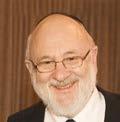
Undeserved Favoritism?
With this week’s Torah portion, Bereshit (Genesis 1:1-6:8), we begin a new cycle of Torah readings. No wonder that we some how feel that the new year has finally really begun. It is also the beginning of a new aca demic year for many of us. No wonder that “newness” is in the air.
For the past month or so, we have been consumed by the range of emotions evoked by our religious holiday observances. We’ve traversed the days of judgment and penitence and have paraded through joy ous and festive days as well. Many of us, however, are still haunted by the ques tion, “Did I pass the trials of the days of judgment? Do I really deserve a ‘good and sweet’ new year?”
Thankfully, there is a verse in this week’s Torah portion that can provide us hope and comfort. It is a verse that seems to indi cate that, at least sometimes, the Almighty favors us although we haven’t earned His favor. Strange as it seems, He “plays favor ites” even with those who don’t deserve such favoritism.
Allow me to prove my point by referring you to the very last verse in this week’s parsha. The preceding verses declare the Lord’s regret that He created mankind and
His decision to “blot out from the earth the men whom I created.” We then read, “But Noah found favor in the eyes of the Lord.”
Do humans have the right to favor whomever they please, without rhyme or reason?
The Hebrew for “found favor” is matsa chen. Did Noah deserve chen? Did he deserve to be favored? The answer lies in an understanding of the word chen. For this, we must turn to another biblical pas sage, this time in Exodus 33:19. There, we find ourselves shocked by the Lord’s own words: “I will favor those whom I pleased to favor and show compassion to those to whom I am pleased to show compassion.”
This is interpreted by the Sages of the Tal mud (see Berakhot 7a) to mean, “I will favor those whom I choose to favor, even if they are not fit to deserve My favor!”
Do we dare conclude that the Lord arbi trarily favors whomever He pleases, at His whim? Do humans have the right to favor whomever they please, without rhyme or reason, even if that means favoring those who are not truly entitled to such favor?
To answer the latter question, let us con sider the observation of the great Talmudic sage, Rabbi Yochanan (Sotah 47a). I para phrase his keen insight: “There are three examples of people who display chen, i.e.,
14 TORAH TIDBITS 1488 / BERESHIT 5783
but you could possibly do them. For when it comes to communications from G-d, you are unique, irreplaceable, sui generis, one of a kind.
who show favor even when that favor is not objectively deserved. One is the chen that one harbors for one’s own hometown even if that town is a slum; another is the chen that a loving husband shows to his wife even if she is less than perfect; and the third is the chen that a consumer retains for an item he purchased even if that item is deficient.”
This exchange presents a fundamental principle of the Torah: that G-d speaks to Moshe in a way that He does not, nor will He in the future ever do again with anyone else. When Moshe says that people come to him seeking G-d, what he means is: I have access to G-d. He speaks to me. (Speaking to G-d isn’t the trick; the trick is when He answers back.) Similarly, when Moshe says that he teaches G-d’s law, what he means is that G-d communicates those laws to him and to no one else.
Chen, then, is favor which is bestowed, even when it is not fully deserved. Thus, for example, when the Kohanim bless us in the synagogue, they recite these words: “May the Lord shine His countenance upon you and show you chen (vichuneka).” The Sifre translates chen in this verse as matnat chinam, an undeserved gift.
sounded too good

www.angelrealty.co.il


to be true – a superb sea-view apartment in Anglo-populated Ashkelon for only 15% down – is actually a reality.”

For Sale in Jerusalem, Amazing cottage with stunning view, 8.5 rooms, great location. 5,25
For Sale in Dagan, Stunning 8 room cottage, middle unit. 3 floors, 230m. 5,250,000 NIS
said another happy client
For Sale in Zayit, Efrat
3 room apt. Great central location 1,625,000 NIS
For Sale in Gefen, Efrat Beautiful 5 room duplex garden 2,850,000 NIS
Owning your own apartment does not just allow you freedom, but offers monetary savings, and an increase in your investment value. Anglo-populated, sunny Ashkelon is the answer! It’s very affordable – from $500,000 with just a 15% down payment, mortgages available as well as bank guarantees. Rental income often in excess of 3.5%.
For Sale in Dekel, Efrat 4 room apt. 2,150,000 NIS
This could very well be the prime purpose of this Yitro story. For, in the very next story, the giving of the Torah, the very same theme of Moshe’s uniqueness as the one to whom G-d speaks is central.
So too does the Talmud (Sanhedrin 108a) comment on our verse at the very end of this week’s parsha: “The heavenly decree to deluge the earth initially included Noah, but although he was undeserving, he found chen in the eyes of the Lord.”
3rd aliya (18:24-27) Moshe heard. He chose judges, with only the most difficult cases brought to him. Moshe sent Yitro home.

One particularly insightful commentator, however, will have none of this. I refer to Rabbi Chaim ibn Attar, the eigh teenth-century author of the work Ohr HaChaim, who does not wish to define chen as unearned favor. Rather, he sug gests that there are virtuous behaviors
It takes an honest leader to accept suggestions to improve. Moshe displays his honesty and humility – if the suggestion is good, embrace it. Just as Yitro accepted the news of the Exodus and affirmed One G-d, so too, Moshe admits he could improve his system. Two men of honesty and humility.
people

cended the mountain. G-d told him: tell the people. If you will listen to Me, keep My
THE BEST DESIGN, ENGINEERING AND INSTALLATION OF AIR
Contact Gabi for more info 0524588716 kerenmalki.org 02-567-0602

Keren Malki empowers families of children with special needs in Israel to choose home care. Donations are tax-approved in Israel, US and UK.
Honoring the memory of Malka Chana Roth ד”יה 1985-2001, killed in the Sbarro bombing.
OU ISRAEL CENTER 15
OU ISRAEL CENTER 7
The
MarSea Modest Swim & Casualwear www.MarSeaModest.net (NIS) www.MarSeaModest.com ($USD) Marci Rapp 050-424-8359 JLEM 02-628-8282 I TLV 03-720-8000 tzviair.com
CONDITIONING SYSTEMS. JUST ASK ANY OF OUR THOUSANDS OF HAPPY CLIENTS. davidz@AshkelonProperties.com LIVE OPPOSITE THE SEA 0544-332621 “It
which are performed so simply and so modestly that they are not seen as such. They are taken for granted by the observer and even by the virtuous individual him self. These actions seem petty and trivial to us mortals, but to the Almighty, they are shining and glorious deeds, deserving of the highest rewards.
The author of Ohr HaChaim maintains that there are several, although few, such mitzvos that we take lightly but which are of great spiritual significance. There is no explicit list of these mitzvot, or else we would concentrate on fulfilling them, and only them, to the exclusion of all other mitzvot.
Noah was thus an individual who seemed quite ordinary in the eyes of others, but the Lord viewed his ordinary deeds with divine eyes, and in His eyes, Noah deserved to be spared.
All of us can be comforted, then, that although we may often judge ourselves to be undeserving, we are unduly harsh in our self-judgment. For surely there is much that we’ve done in the way of charitable and otherwise praiseworthy deeds that we have underrated but which merited inclu sion in the divine list of deeds deserving chen.
We pray that the Almighty “plays favor ites” with us and judges us less harshly than we sometimes judge ourselves, and grants us a good and sweet year, beginning with Parshat Bereshit.
Most exquisite properties in Jerusalem!!

NEW LISTING! Luxurious garden apartment on a small lane of Old Katamon - 340m built on 2 levels, 8 rooms, separate unit with separate entrance, high ceilings, full of charm, very quiet and bright, 130m private garden, top of the line finishes, close to the parkDEBORAH - 054-4804767
NEW LISTING! Beautiful new penthouse in Greek Colony- 190m with 80m terraces, succah, beautiful views, 5 rooms, elevator, parking, renovated at very high standard, spacious living areas and huge kosher kitchen MAYA – 054-6650184
For Serious clients only! In the Orient Hotel unique 280m apartment on one level with large succah terrace, top standard, all furnished, 7 rooms, all facilities of the hotel, pool, spa DEBORAH - 054-4804767
Private small building in Baka - Shimshon St. 300m with additional building rights, huge private garden, divided as 3 units so can be private house of 3 separated apartments, very attractive price DEBORAH - 054-4804767
T&T

On the exquisite Elcharizi St.,Rechavia new project, 280m penthouse, 100m terraces, finishes and layout according to buyer requests! DEBORAH - 054-4804767
Ben Maimon St. Duplex new apartment, 5 bedrooms, 4 ensuite, 4 terraces, private parking, Shabbat elevator, all renovated, 3 exposures, very sunny! DEBORAH - 054-4804767
In a small lane of the German ColonyGarden apartment with private entrance, 250m with private garden, parking, high ceilings, in an Authentic beautiful 3 apartment building MAYA – 054-6650184
On a small lane of Baka, beautiful 190m penthouse, 6 rooms, 30m terrace to greenery views, parking, Shabbat elevator, small MAYA – 054-6650184
Talbieh - on the exquisite Balfour St, 300m apartment on one level completely renovated at top standard, succah terrace, parking DEBORAH - 054-4804767
donated by Marion & Michael Silman Ita Rochel 02-560-9125

0544-804767
King David St. 26 www.real-estate-jerusalem.co.il
16 TORAH TIDBITS 1488 / BERESHIT 5783
INVESTMENTS 02-6744000
LEADING BOUTIQUE REAL ESTATE FIRM, O n M e n d e l e S t . T a l b i completely renovated, •



OU ISRAEL CENTER 17 in Israel and the US to assist in tax filing and record keeping ealth by organizing and streamlining finances to safeguard your assets We think of everything, so you don’t have to bill payment and bank and monitoring income, expenses and With Donor Rescue, you can recapture thousands of dollars from donors who got distracted before clicking submit. THE PHONE RINGS. THE BABY CRIES. THE SHIUR BEGINS. Contact CauseMatch today to learn about using Donor Rescue during your next crowdfunding campaign. 917.341.4586 02.376.1257 solutions@causematch.com causematch.com OU ISRAEL CENTER 15 "An and foltaught for who of and happiness. it a SEALING SERVICES 052-385-9944 • 054-499-9043 SEALING SERVICES AND ROOFING
MIDEI CHODESH
B'CHODSHO
Is it Good?
One phrase, repeated over and over again in the creation narrative, should capture our attention. Periodically, as HaShem views his handiwork, the Torah declares, “and God saw that it was good.”
What does this phrase mean?
When you or I create, we have no way of knowing what the finished product will be. We often step back, therefore, to deter mine whether what we are producing matches what we intended to produce. For an all-knowing God, however, this review is obviously unnecessary. An all- perfect being cannot make mistakes. What does the Torah, therefore, mean to convey with the statement. “And God saw that it was good”?
The Ramban offers a brilliant solution to our question by differentiating between two different actions attributed to God through out the creation narrative.
When God speaks during the story of creation, the Ramban explains, he brings something into being; he creates. For exam ple, the Torah’s statement “And God said, ‘Let there be light,’ is a textual indication that, at this point, God creates light.
When God sees, on the other hand, he moves from the realm of creating to the realm of sustaining. The phrase “and God saw that it was good” thus appears when God has completed an element of creation
BY RABBI SHMUEL GOLDIN Faculty, OU Israel Rabbi Emeritus, Congregation Ahavath Torah, Englewood NJ
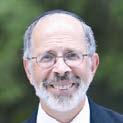
and desires to sustain its existence at that level.1
The appearance, however, of the phrase “and God saw that it was good” is not con sistent in the text. This phrase is totally absent on the second day of creation, when HaShem separates heaven and earth. And, while the phrase does appear on creation’s sixth day; its mention precedes, and there fore seems to exclude, the creation of man.
How are we to explain these omissions?
Rashi explains that the work of the sec ond day of creation is incomplete at the end of that day. An incomplete phenomenon, says Rashi, cannot be referred to as “good.” The phrase “and God saw that it was good” is, therefore, omitted on the second day. On creation’s third day, the work of the sec ond day is ultimately finished. In addition, another phase of creation is launched and completed on that day. The Torah, there fore, repeats the phrase “and God saw that it was good” twice on the third day, each time marking the completion of a stage of creation.2
As for the apparent exclusion of man from the phrase “and God saw that it was good” on the sixth day, numerous commentaries explain the Torah’s message to be a power ful one: Concerning man, the verdict is still out.
18 TORAH TIDBITS 1488 / BERESHIT 5783
1 Ramban Bereishit 1:2 2 Rashi Bereishit 1,7
Unlike the rest of creation, man cannot be considered good from the outset, sim ply because he is created by God. Man’s determination as a creature of value will ultimately depend upon his own choices and actions; upon the self-determined qual ity of his life.3
The Torah’s omission of the phrase “and God saw that it was good” in association with the creation of man is thus essentially a challenge. We are challenged to complete the story; to determine whether, in the final analysis, the creation of man will be consid ered “good.”
Taking chazal’s approach one step further, we can perhaps suggest a unified approach to the two omissions we have identified in the text…
On the second day of creation God cre ates the firmament, effectively separating the realms of heaven and earth. Could the absence of the phrase “and God saw that it was good” on that day be an indication that, on one level, the separation of heaven and earth is not “good?” Perhaps the omission reflects God’s fundamental desire that the realms of heaven and earth remain connected … that the spiritual world and the physical world interact with each other.
If so, why would God separate these realms on the second day?
To challenge man to unite them through his efforts.
The Rabbis note that man is the only creature forged Min Ha-elyonim u-min Ha-tachtonim-from both the upper and the
lower spheres.4 We are essentially creatures in conflict, shaped from the dust of the earth into which God breathes “the spirit of life.” Heaven and earth vie for supremacy within our souls. We are at once part of the ani mal kingdom, and share with all creatures of that kingdom basic urges and needs. At the same time, however, we are the only creatures in creation that can aspire to spir ituality, poetry, and song.
While other religions preach that sanc tity can only be attained by denying the base instincts within us, by retreating from the earthly; Judaism preaches that man is meant to unite heaven and earth within his soul. We are enjoined to raise the earth bound heavenward and to bring heaven to earth, through the study of Torah, the performance of everyday mitzvot, and-ulti mately- the perfection of our behavior. We are challenged, in short, to sanctify God’s name through the way we live our lives. When we do so, God’s judgment “it is good” is restored both to the second day of creation and to the creation of man.
As we begin our new year together, we should maintain our focus on this ultimate goal. Each of us possesses the ability to reunite what God, perhaps reluctantly, separated on the second day of creation… Each of us can earn God’s approval over the creation of man… Each of us possesses the ability to re-unite heaven and earth in this world, every day of our lives.
4 Midrash Rabba Bereishit 12,8
Nehama Leibowitz, Studies in Bereishit, p.9
Rabbi Goldin is the author of the OU Press volumes “Unlocking the Torah Text,” and “Unlocking the Haggada."
OU ISRAEL CENTER 19
3
RABBI AZARYA BERZON
As we begin the new cycle of the reading of the Torah this Shabbat with parshat Bereshit we have the opportunity once again to reengage in studying the weekly portion. Rabbi Azarya Berzon shares with us a unique insight that touches on the impact that Torah study has on both the mind and the heart of the Jew.

Yom HaShishi
Rashi points out that “THE” Sixth day men tioned in the story of creation alludes to the sixth day of the month of Sivan and teaches that the purpose of creation was the receiving of the Torah.
The Talmud in Masechet Shabbat, 88a, tells us that each Jew at Har Sinai received two crowns, one for “na’aseh” and a second for “nishma.” After the sin of the Golden Calf these crowns were taken away. This is based on the pasuk, “And Bnei Yisrael stripped themselves of their ornaments” (Shemot, 33:6).
What do these crowns represent? Why were they given to the people at Har Sinai, and taken away from them following the sin of the Golden Calf? After the sin of the Golden Calf, Moshe Rabbeinu ascended the mount to receive the second set of Tablets. When Moshe came down from the mountain his face sent forth rays of majesty (Ibid, 34:29). What is the significance of these rays?
We may find the answers to these questions
if we formulate a precise definition of the Mitzvah of Torah study. Every mitzvah has a specific act that defines it. The mitzvah of Torah study is defined by the cognitive act of learning Torah. Rabbi Joseph Soloveitchik, zatzal, explained that there is an additional aspect to the mitzvah of Talmud Torah, namely, the sanctification of the personality of the Torah student.
Thus the mitzvah consists of two parts: 1) to occupy oneself in the study of Torah, in order to know its teachings; 2) to uplift the spiritual personality and sanctity of the indi vidual who studies it. This latter aspect, i.e. the transformation of the personality of the Torah student, is indicated by the Mishnah in Avot (6:1): “Whoever occupies himself with the study of Torah for its own sake merits many things...he is called friend, beloved...it invests him with modesty and reverence, and makes him virtuous, pious, upright and faithful...it raises him above all creatures.” There are two blessings recited before the study of Torah.The first, “And You commanded us to devote ourselves to the study of Torah,” is related to the activity of Torah learning. The second: “Make the teachings of the Torah pleasant on our lips...that we and our chil dren and our children’s children may know You and learn Your Torah for the love of it,” is related to the influence the Torah has on its students. Through this blessing we beseech Hashem to elevate us spiritually, purify our souls, and make us bearers of the Name of
20 TORAH TIDBITS 1488 / BERESHIT 5783
Faculty OU Israel Center
GUEST COLUMN
Hashem. This corresponds to the second aspect of Talmud Torah, the sanctity that is acquired by Torah students as a result of Torah study.
The Rambam in the third chapter of Hilchot Talmud Torah describes three crowns that were given to Klal Yisrael. Whereas the crown of “Kehunah” (priesthood) was designated exclusively for the descendants of Aharon, and the crown of “Malchut” (kingship) was designated solely for the descendants of David, the crown of Torah is available for any Jew.
I would like to raise the following question: The Rambam dedicates his “Mishnah Torah” to Halacha. It seems unusual for him to present a philosophical discussion about the crown of Torah in this work. Furthermore, the Rambam in the first chapter of the Laws of Talmud Torah omits mention of the crown of Torah. In that chapter he writes: “One is required to set aside intervals of time each day for Torah study.” Yet in the third chapter of the Laws of Talmud Torah, the Rambam writes “One whose heart prompts him to fulfill this Mitzvah properly and to be crowned with the crown of Torah should not divert his attention from the study of Torah….” It is clear from the Rambam that in order to acquire the crown of Torah one must focus all his energies and dedicate himself entirely to the study of Torah.
To reconcile the contradiction, we suggest that whereas the first chapter is devoted to the obligation to engage in Torah study, the third chapter - which opens with the “crown of Torah”- develops the concept of the sanc tification of the student of Torah.The latter concept reflects the change in the very being of the Torah scholar. One who dedicates him self to the study of Torah becomes endowed
with the sanctity of Torah. This new status is reflected in the “Keter Torah’’ which he has acquired. The Rambam states clearly that in order to acquire the crown of Torah one must be totally dedicated to Torah study, to the exclusion of other endeavors.
This higher sanctity of Keter Torah came into being at Har Sinai when Bnei Yisrael declared “We shall do, and learn.” Shortly afterwards the people worshiped the Golden Calf, and Hashem thought to destroy them. Moshe pleaded on their behalf and his prayers were accepted. “And the Lord said to Moshe, go, lead the people to the place of which I have spoken to you; behold, my angel will go before you” (Shemot 32:34). The reaction of the people should have been one of relief and consolation. Instead, “And when the people heard these evil tidings they mourned; and no man put on his ornaments” (Ibid, 33:4).
Apparently, although Hashem had granted atonement, the past left its mark. The people were no longer worthy of the special sanctity of the Torah. The crowns they had acquired only a short time before, were removed and the people grieved. According to the Talmud, these crowns were transferred to Moshe. What led the Sages to this conclusion? Shortly after, the Torah describes the rays of light that emanated from the face of Moshe. These rays represent the sanctity of the Torah inherent in the personality of Moshe.
The concept of “Keter Torah” must inspire each of us to inculcate within ourselves a thirst and a desire for “Keter Torah”. We must dedicate more of our energies to “Tal mud Torah Lishmah”, so that we can sanctify ourselves with “Kedushat HaTorah”, and make ourselves sanctuaries for the presence of Shechinah.
OU ISRAEL CENTER 21
16-MONTH ARTISTS CALENDAR
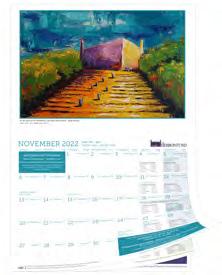
Important Announcement!
to all who donated to the Chesed Yitzhak & Sheindel Rosh Hashanah Appeal.We are pleased to announce that the Amutah’s name has been changed to YESH EZRA. From now on, to help the needy please:
Assign checks to YESH EZRA and send them to “Yesh Ezra,” POB 36156, Romema, Jerusalem.

Enter the Website at www.yeshezra.org and follow instructions for $ and NIS contributions.
EZRA is poised to become one of Israel’s key charities assisting the
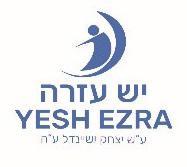
caring for children of divorced families, families with
and job assistance for the Chareidi
Vechatima Tova, Menachem Persoff, on behalf of YESH
menpmp@gmail.com
22 TORAH TIDBITS 1488 / BERESHIT 5783
Thanks
•
•
YESH
needy,
mentally ill members,
community. Ketiva
EZRA.
050-570-1067 Shmitah Lechumra and Otzar Haaretz Produce! ORDER ONLINE AND GET THE PRODUCTS YOU PREFER DELIVERED STRAIGHT TO YOUR DOOR! ORDER TODAY AND ENJOY SUPERIOR QUALITY, SELECTION AND SERVICE! Use coupon code welcome2ftf and save 5% off your first order! www.FarmToFamily.co.il Netanel 050-344-6261 | Office 058-444-6260 American Service! American Products & Specialty Items! Are you tired of shlepping your groceries home? (718) 677-6886 info@hebronfund.org www.hebronfund.org Wishing you a Happy & Healthy New Year from Hebron! Your donation supports the HEROES living in Hebron and the courageous SOLDIERS who keep the city safe. With a donation to Hebron you will receive a copy of the new 2022/2023 - 5783 HEBRON FUND
with original artwork from three Hebron artists. * If you are a Hebron Fund donor, and you do not receive your calendar by Sep. 1st, please contact our office. A STRONG HEBRON IS A STRONGIsrael! Israel!

OU ISRAEL CENTER 23
CONVERSATION
Thoughts on the Weekly Parsha from RABBI LORD JONATHAN SACKS ZT"L

Dedicated by
Robert Sreter

The Art of Listening
What exactly was the first sin? What was the Tree of Knowledge of Good and Evil? Is this kind of knowledge a bad thing, such that it had to be forbidden and was only acquired through sin? Isn’t knowing the difference between good and evil essential to being human? Isn’t it one of the highest forms of knowledge? Surely God would want humans to have it? Why then did He forbid the fruit that produced it?
In any case, did not Adam and Eve already have this knowledge before eating the fruit, precisely in virtue of being “in the image and likeness of God”? Surely this was implied in the very fact that they were commanded by God: Be fruitful and multi ply. Have dominion over nature. Do not eat from the tree. For someone to understand a command, they must know it is good to
obey and bad to disobey. So they already had, at least potentially, the knowledge of good and evil. What then changed when they ate the fruit? These questions go so deep that they threaten to make the entire narrative incomprehensible.
Maimonides understood this. That is why he turned to this episode at almost the very beginning of The Guide for the Perplexed (Book 1, Chapter 2). His answer though, is perplexing. Before eating the fruit, he says, the first humans knew the difference between truth and falsehood. What they acquired by eating the fruit was knowledge of “things generally accepted.”
But what does Maimonides mean by “things generally accepted”? It is generally accepted that murder is evil, and honesty
24 TORAH TIDBITS 1488 / BERESHIT 5783
תומשנ יוליעל ה״ע זייא דוד לארשי תב הדלוגו רשא בקעי ןב סחנפ ה״ע רטרש קחצי תב הינעמו בייל הירא ןב לאירזע
Dr.
DDS., M.S.
Former Chief Rabbi of the United Hebrew Congregations of the
Commonwealth COVENANT &
May the learning of these Divrei Torah be תמשנ יוליעל HaRav Ya'akov Zvi ben David Arieh zt"l תמשנ יוליעל ה"ע קחצי םייחו הקבר תב עבש הגייפ תידוהי ל"ז ןהכה והיתיתמו הקנאיב ןב ףסוי In loving memory of Judith Munk a"h on her second yahrzeit and Joseph Munk z"l on his 29th yahrzeit Our beloved parents, grandparents and great grandparents. You are sorely missed Samuel, Frohlich and Munk families
good. Does Maimonides mean that moral ity is mere convention? Surely not. What he means is that after eating the fruit, the man and woman were embarrassed that they were naked, and that is a mere matter of social convention because not everyone is embarrassed by nudity. But how can we equate being embarrassed that you are naked with “knowledge of good and evil”? It does not seem to be that sort of thing at all. Conventions of dress have more to do with aesthetics than ethics.
It is all very unclear, or at least it was to me until I came across one of the more fascinating moments in the history of the Second World War.
After the attack on Pearl Harbour in December 1941, Americans knew they were about to enter a war against a nation, Japan, whose culture they did not
understand. So they commissioned one of the great anthropologists of the twenti eth century, Ruth Benedict, to explain the Japanese to them, which she did. After the war, she published her ideas in a book, The Chrysanthemum and the Sword. One of her central insights was the difference between shame cultures and guilt cultures. In shame cultures the highest value is honour. In guilt cultures it is righteousness. Shame is feeling bad that we have failed to live up to the expectations others have of us. Guilt is what we feel when we fail to live up to what our own conscience demands of us. Shame is other-directed. Guilt is inner-directed.
Philosophers, among them Bernard Williams, have pointed out that shame cultures are usually visual. Shame itself has to do with how you appear (or imag ine you appear) in other peoples’ eyes. The
Israel’s LEADING and MOST TRUSTED furniture repair company Glue with us once and you’ll stick with us forever
for all your loose
RECLINER REPAIR
Remove broken wood
REPLACEMENT
To help you make those small
with much
TIPS - For quiet chair movement (your downstairs neighbor will thank you!)



TIRED OF HAVING TO CROWD YOUR GUESTS AROUND MULTIPLE TABLES??
Call us to hear about our heavy duty table slides to more than double (or even triple!) the current length of your table.
• INSURANCE QUOTES - We handle hundreds of freight damage claims from overseas as well as local moves.
: www.thefurnituredoctor.co.il

02-999-2418
Email: office@thefurnituredoctor.co.il
WhatsApp: 058 787 3755
OU ISRAEL CENTER 25
• PERMANENT REGLUING
& shaky furniture • EXPERT SOFA FRAME &
• SEAT CORE REPLACEMENT -
seat and replace
stronger wood • CANE SEAT/BACK
• FURNITURE MARKERS -
scratches disappear • LEG
•
WE ARE GROWING AND ARE NOW HIRING SEE DETAILS ON OUR WEBSITE Website
Phone:
instinctive reaction to shame is to wish you were invisible, or somewhere else. Guilt, by contrast, is much more internal. You cannot escape it by becoming invisible or being elsewhere. Your conscience accom panies you wherever you go, regardless of whether you are seen by others. Guilt cul tures are cultures of the ear, not the eye.
With this contrast in mind we can now understand the story of the first sin. It is all about appearances, shame, vision, and the eye. The serpent says to the woman: “God knows that on the day you eat from it, your eyes will be opened, and you will be like God, knowing good and evil.” That is, in fact, what happens: “The eyes of both of them were opened, and they realised that they were naked.” It was appearance of the tree that the Torah emphasises: “The woman saw that the tree was good to eat and desirable to the eyes, and that the tree was attractive as a means to gain intelli gence.” The key emotion in the story is shame. Before eating the fruit the couple were “naked, but unashamed.” After eating it they feel shame and seek to hide. Every element of the story – the fruit, the tree, the nakedness, the shame – has the visual ele ment typical of a shame culture.
But in Judaism we believe that God is
heard not seen. The first humans “heard God’s Voice moving about in the garden with the wind of the day.” Replying to God, the man says, “I heard Your Voice in the garden and I was afraid because I was naked, so I hid.” Note the deliberate, even humorous, irony of what the couple did. They heard God’s Voice in the garden, and they “hid themselves from God among the trees of the garden.” But you can’t hide from a voice. Hiding means trying not to be seen. It is an immediate, intuitive response to shame. But the Torah is the supreme example of a culture of guilt, not shame, and you cannot escape guilt by hiding. Guilt has nothing to do with appearances and everything to do with conscience, the voice of God in the human heart.
The sin of the first humans in the Garden of Eden was that they followed their eyes, not their ears. Their actions were determined by what they saw, the beauty of the tree, not by what they heard, namely the word of God commanding them not to eat from it. The result was that they did indeed acquire a knowledge of good and evil, but it was the wrong kind. They acquired an ethic of shame, not guilt; of appearances not con science. That, I believe, is what Maimonides meant by his distinction between trueand-false and “things generally accepted.” A guilt ethic is about the inner voice that tells you, “This is right, that is wrong”, as clearly as “This is true, that is false”. But a shame ethic is about social convention. It is a matter of meeting or not meeting the expectations others have of you.
Shame cultures are essentially codes of social conformity. They belong to groups where socialisation takes the form of
26 TORAH TIDBITS 1488 / BERESHIT 5783
The OU Israel Family wishes Mazal Tov to Rabbi Shalom & Dr. Tamar Rosner and family on the marriage of their daughter Avigayil to Amitai Bar Tikvah
internalising the values of the group such that you feel shame – an acute form of embarrassment – when you break them, knowing that if people discover what you have done you will lose honour and ‘face’.




Judaism is precisely not that kind of morality, because Jews do not conform to what everyone else does. Abraham was willing, say the Sages, to be on one side while all the rest of the world was on the other. Haman says about Jews, “Their cus toms are different from those of all other people” (Esther 3:8). Jews have often been iconoclasts, challenging the idols of the age, the received wisdom, the “spirit of the age”, the politically correct.

If Jews had followed the majority, they would have disappeared long ago. In the biblical age they were the only monotheists in a pagan world. For most of the post-bibli cal age they lived in societies in which they and their faith were shared by only a tiny minority of the population. Judaism is a liv ing protest against the herd instinct. Ours is the dissenting voice in the conversation of humankind. Hence the ethic of Judaism is not a matter of appearances, of honour and shame. It is a matter of hearing and heeding the voice of God in the depths of the soul.

OU ISRAEL CENTER 27
Flying Soon? Travel with Confidence 1UniTravel - Medical Insurance at great prices Choose from multiple options 1unitravel.brokersnexus.com 1UniSim - Sims for USA and Worldwide Starting at $40 sales@1unisim.com Call 077-400-3199 or USA 718-715-0001 Your Jewelry is Worth Gold! @Fancycolors vmkdiamonds.com vmk_diamonds Jewelry Manufacturer Upgrade your old Jewelry piece to a new modern design Best rate for broken and old gold pieces, inheritances Service in Hebrew | English | French | Italian Safe & Convenient Member of the Israel Diamond Exchange & the World Federation since 1997 Pay Cash 054-397-7707 Mishael Vardi Dr. J Facial Aesthetics Soften Lines & Reduce Wrinkles Botox | Fillers Hair Growth | Acne Scars Jason Cohen, M.D. Certified Aesthetic Medicine Specialist Anesthesiologist & Interventional Pain Medicine Modiin Clinic 050-252-0991 continued on next page...
The drama of Adam and Eve is not about apples or sex or original sin or “the Fall” – interpretations the non-Jewish West has given to it. It is about something deeper. It is about the kind of morality we are called on to live. Are we to be governed by what everyone else does, as if morality were like politics: the will of the majority? Will our emotional horizon be bounded by honour and shame, two profoundly social feelings? Is our key value appearance: how we seem to others? Or is it something else altogether, a willingness to heed the word and will of God? Adam and Eve in Eden faced the archetypal human choice between what their eyes saw (the tree and its fruit) and what their ears heard (God’s command). Because they chose the first, they felt shame, not guilt. That is one form of “knowledge of good and evil”, but from a Jewish perspective, it is the wrong form.
Judaism is a religion of listening, not seeing. That is not to say there are no visual elements in Judaism. There are, but they are not primary. Listening is the sacred task. The most famous command in Juda ism is Shema Yisrael, “Listen, Israel.” What made Abraham, Moses, and the prophets different from their contemporaries was that they heard the voice that to others was inaudible. In one of the great dramatic scenes of the Bible, God teaches Elijah that He is not in the whirlwind, the earthquake, or the fire, but in the “still, small voice.”
It takes training, focus and the ability to create silence in the soul to learn how to lis ten, whether to God or to a fellow human being. Seeing shows us the beauty of the cre ated world, but listening connects us to the soul of another, and sometimes to the soul
of the Other, God as He speaks to us, calls to us, summoning us to our task in the world.
If I were asked how to find God, I would say, Learn to listen. Listen to the song of the universe in the call of birds, the rustle of trees, the crash and heave of the waves. Lis ten to the poetry of prayer, the music of the Psalms. Listen deeply to those you love and who love you. Listen to the words of God in the Torah and hear them speak to you. Listen to the debates of the Sages through the centuries as they tried to hear the texts’ intimations and inflections.
Don’t worry about how you or others look. The world of appearances is a false world of masks, disguises, and conceal ments. Listening is not easy. I confess I find it formidably hard. But listening alone bridges the abyss between soul and soul, self and other, I and the Divine.
Jewish spirituality is the art of listening.
Around the Shabbat Table
1. Can you think of some examples of Jews in history who demonstrated how Judaism is a guilt culture, not a shame culture?
2. How is listening an important Jewish value?
3. What lessons can you learn for your life from the difference between shame and guilt?
Covenant and Conversation 5782 is kindly supported by the Maurice Wohl Charita ble Foundation in memory of Maurice and Vivienne Wohl z”l. These weekly teach ings from Rabbi Sacks zt"l are part of the ‘Covenant & Conversation’ series on the weekly Torah reading. Read more on www.rabbisacks.org.
28 TORAH TIDBITS 1488 / BERESHIT 5783
To new beginnings
As we begin a new cycle of Torah reading, we look forward to helping you create a new life in your new home in Jerusalem
www.remaxjerusalem.com













Mevo Hamatmid 16, City Center
2 room apt, 44 sqm, parking. Serviced building (pool, spa, gym, 24/7 security) 10 min walk to Old City. Shabbat elevator, handicapped accessible. NIS 2,100,000 Orna Even 054-621-6069
Tkhelet Mordechai St 21, Romema

A rare apartment in the luxurious Pninat Chemed project. 5 rms (153sqm), Sukkah balcony with a breathtaking view. Asking price NIS 7,290,000 Malki Carasso 053 548 7161
Rabbi Uziel Street, Bayit Vagan
Multi-level 223 sqm, huge terrace, Building rights for 455+ sqm amazing views balconies, storage ,3 private parking spaces, private elevator NIS 12,950,000 Ezra Levy 054-842-1289
Beit Nekofa, Private Estate
Authentic historic house, 5 room, fully accessible Over 1.5 dunam land. Possibility to build second house on the lot Handicap accessible Asking NIS 9,250,000 Nelly Ephrati Artom 052-476-4356

Rechavia Garden Duplex
Spacious garden apt. 400 Sqm on two floors+ 200 Sqm wraparound garden. Can separate into two units. 2 indoor parking spaces Handicapped access. Elevator. Orna Even 054-621-6069

Yehuda 7, Baka
Magnificent Old Arab home, 4m ceilings, arches, 4 rms (120 sqm ) +huge private garden ( 300 sqm) + 60 sqm building rights, Private parking NIS 9,800,000

Alyssa Friedland 054 668 4111
Yael St, Baka Penthouse
Architecturally designed, beautiful penthouse apt, 5 rooms, 3 bathrooms, Succah, parking, storage. Perfect for a family- ready to move in. NIS 6,400,000 Orna Even 054 621 6069

Oved Street, Abu-Tor Duplex penthouse with spectacular views. Currently divided into 2 units. Total of 300+ Sqm, Succah balconies, Storage, indoor parking, private elevator. NIS 6,670,000 Menachem Lindner 050-337-7792

Horkania Penthouse, Katamon/Rasco


Newly renovated, 4 bedrooms, 3 full baths,150 sqm, large balcony with amazing view, U/F heating, central a/c, elevator, parking. NIS 6,465,000
RE/MAX Vision 072 392 2109

OU ISRAEL CENTER 29
…
The largest collection of exclusive Jerusalem properties is just one search away
PROBING THE PROPHETS
BY RABBI NACHMAN (NEIL) WINKLER Faculty, OU Israel Center



TheTorah opens with the sim ple declaration: Breishit BARA Elokim…”, “In the beginning of Hashem’s creation of the heaven and earth…” and proceeds to describe the G-d’s creation of the universe. In a parallel fash ion, our haftarah, a selection taken from the 42nd and 43rd prakim of Sefer Yesha yahu, opens with the words “Ko amar HaKel Hashem, BOREH HaShamayim. This opening declaration that clearly connects the haftarah to the parasha moved Chazal to establish it as the reading for this week, as it serves a reminder of the Torah read ing to those living during those times that public Torah reading was banned.
But there is much we learn from these few words by contrasting them to the expression used in the Torah. The words of the parasha depict the actions of Hashem when He fashioned the world, a depiction of past events. The haftarah, seemingly, does the same as it describes G-d as the “Boreh”, THE Creator. Our tradition,
however, sees that word not simply as a noun, the “Creator”, but also as a verb, One who is “creating”. This seemingly minor adjustment reflects a major change in our understanding. The Torah speaks in past terms as it describes the creative process that took place in the beginning of time. The navi, however, clarifies for us that the cre ative process is ongoing and is not a thing of the past. Indeed, the very last phrase of the Torah’s description of creation, “asher bara Elokim LA”ASOT”, is understood as a subtle reminder that Hashem created an ‘unfinished’ world that still has to be completed, “la’asot.” Creation continues.
This concept is repeated numerous times. The prophet Yeshayahu declares (45; 7): “Yotzer or uvoreh choshech”, “I am Hashem Who FASHIONS light and CRE ATES darkness, Who MAKES peace ….I am Hashem who DOES all of this”. Our prayers are replete with this same idea. Each morning we praise G-d as “Yotzer ham’orot,” He who CREATES the lights,
30 TORAH TIDBITS 1488 / BERESHIT 5783
Rabbi Winkler's popular Jewish History lectures can be viewed by visiting the OU Israel Video archive: https://www.ouisrael.org/video-library
while each night we acclaim Him as the One Who “mavdil bein yom uvein layla”, SEPARATES day from night. Generations of Rabbinic scholars understood that Hashem renews creation constantly, as we say daily: “Ham’chadesh b’tuvo b’chol yom tamid ma’aseh breishit”, that G-d renews prime val creation each and every day.
Our belief in Hashem’s constant involve ment in the natural world extends to His role in ongoing events and in history itself. In fact, that is the very purpose of Yeshayahu’s message to the nation in this haftarah: that G-d shapes events and con trols history. In truth, it is a message that we would not know unless we studied the earlier and later chapters in Sefer Yesha yahu. There, the navi speaks to Israel as the “suffering and abused” servant of Hashem, and assures them that G-d would bring a redeemer to return them to their land where they will then fulfill their mission to spread Hashem’s word to the world.
While discussing the approaching redemption, Yeshayahu predicts the fall of the mighty Babylonian empire, brought upon them by G-d’s power, and the rise of the redeemer, “His anointed one,” Cyrus (45; 1). And in those chapters (45-46), the prophet repeats to all the nations the same ideas that he shared with Israel in the earlier chapters, that is, that Hashem has the power to do the seemingly impossible: He still creates the universe and controls nature and, therefore, still shapes history. The message of our haftarah, therefore,
is essential for the proper understanding of the parasha itself. The All-Powerful Creator did not create and then depart His world. He is concerned with, cares for and guides His universe. And, as a result, the Torah – at its very outset – teaches us to remem ber that Hashem is always here, that He is always watching …..and that He always cares.
Mazal Tov to Aytan & Rivki Himelstein and family on the birth of a grandson

OLDER
ARNONA - Spacious penthouse, 250m, renovated, furnished, huge living room,
large terraces + 2 family rooms, 3rd floor + elevator, close to buses, makolet, ganim, calm, immediate
VERY GOOD
Bustan Baka - in a very beautiful boutique building, spacious, 2 rooms, ground floor, no steps, elevator, balcony, parking,
MENDEL
TALBIEH - Building with high ceilings,
spacious rooms, 108m + terrace (approx. 30m), elevator, to
ARNONA HAHADASHA - Very spacious
room apartment, 120m, in a recent luxurious building, terrace, view, 5th floor, Shabbat
store-room,
OU ISRAEL CENTER 31
2
MENDEL 052-8980111
INVESTMENT!! In
2450000 NIS
052-8980111
4
renovate MICHAEL 052- 3202488
5
elevator,
parking MICHAEL 052-3202488 MASSAGE THERAPIST & FITNESS TRAINER 052.673.3704 I www.andyhealth.com | jerusalemmyhome@hotmail.com TUVIA ANDY HAAS BALANCE and FALL-PREVENTION SPECIALIST for
ADULTS Maintain Healthy Bones and Muscles Decrease Stiffness and Joint Pain Increase Strength! Stay Independent!
This week Shabbat afternoon shiur by Rabbi Chanoch Yeres at 4:15pm in the back garden of the OU Israel Center
Rav Kehilla, Nofei HaShemesh Maggid Shiur, Daf Yomi, OU.org Senior Ra"M, Kerem B'Yavneh

A Tale of Two Sins
In Parshat Bereshit we encounter two major transgressions. The first is committed by Adam and Chava and the second by Kayin. Adam and Chava eat from prohibited fruits of the eitz hada’at and Kayin murders his brother. Is there any connection between these two erroneous acts?
Rav Bloomensweig in his sefer V’hithalach ti B’tochechem suggests that the sins of Adam and Kayin may be viewed as opposites. Ad am belittled himself and became overpow ered by his animalistic instinct of obtaining pleasure from the attractive and appealing fruit. Rather than stand firm as a holy man, he was persuaded by a lowly snake to par take in a prohibited object.
On the other hand, Kayin held himself on a pedestal. He felt he was great and the sac rifice he brought should be more favorable than that of his brother. He would step on another in order to raise himself up, which eventually led to the elimination of his brother Hevel. Whereas Adam degraded himself to the level of a creature, Kayin sought to establish himself as the ultimate being, irrespective of others around him.
When God reaches out to Adam after his sin, He says “Ayeka”. How could you have committed that act? Where are you? More
was expected of his behavior. How could Adam have committed this transgression? Adam did not live up to his potential. He fell by submitting to his desires.
When God reaches out to Kayin after his sin, He inquires: “where is your brother”? Kayin, whose focus was solely on himself –and could not face rejection - is being told to avoid being self-centered and to consider the ramifications of his actions on others. To recognize that man’s fate in this world is to seek perfection but not at the expense of others.
These two transgressions highlight two character traits that Hazal warn are best to be avoided. Adam’s sin was due to his sub mission to “ta’ava” – physical pleasure and desire. Kayin’s sin was due to arrogance which leads to uncontrollable anger.
We are to learn important lessons from the behavior of both Adam and Kayin. We need to strengthen our self-control and avoid submitting to our desires. To not allow ourselves to fall and engage in acts that are not becoming of us. In addition, being self-centered leads to conceit and jealousy and can result in improper behavior towards others. May we find the proper balance of self confidence and respect for others so that we can internalize the messages relayed to Adam and Kayin and do our part to achieve - “olam chesed yibaneh” – building a world of chesed , living in peace and respecting our fellow man.
32 TORAH TIDBITS 1488 / BERESHIT 5783
RABBI SHALOM ROSNER















OU ISRAEL CENTER 33 JERUSALEM REAL ESTATE ANGLO- SAXON-JERUSALEM ISRAEL’S LEADING REAL ESTATE NETWORK 3 Moshe Hess St., Jerusalem 0778038511 Old Katamon (Nakdimon) - Charming 7 rm duplex, 1st floor, amazing roof terrace, great views, option to purchase 2 rm adjacent apt. Exclusive! Tovi: 053-6268110 Givat Havradim - (Tchernichovsky) Last 4 + 5 room apts and penthouses in New Boutique Building, Top floors (5-7), huge Sukkah terraces, Shabbat elevator, view, elegantly designed, quality finishings, 3 exposures, quiet, central location, Exclusive! Ilana 053-4872526 Arnona "Savionay" Project, renovated, 4 rms, 85m, garden, 54m, airconditioning, elevator, access for disabled, underground parking, total privacy. Exclusive! Anita 053-6318355
SMILES
Tantalizing Truth
When Hashem set out to make man, the heavenly angels gathered in groups to voice their opinion whether man ought to be cre ated. Chessed was in favor, as it believed man is one to act with lovingkindness. Emet, Truth, opposed man’s creation since it believed man to be full of lies. Hashem then took Emet and hurled it to the ground, ostensibly to give those in favor of man’s cre ation the majority voice (Bereisheet Rabbah 8). How do we understand this midrash?
There must have been a more compelling reason for Hashem’s act, especially since the midrash continues and says after being thrown to the ground, “emet mei-eretz tizmach – truth will sprout forth from the ground.” (Tehillim 85:12) What can we learn from this enigmatic episode?
Rav Uri Weisbloom, in his work He’arat Derech, offers a beautiful insight into this midrash. After Adam Harishon sinned by eating from the Eitz Hada’at, his yetzer hara became part of his nature, impacting man’s every decision and action. Our thought process is never completely altruistic, our negative middot influence our choices. For example, we may go out of our way to help another person, yet deep within, we are motivated by the honor we expect to receive
Faculty, OU Israel Center
for what we have done. Thus ‘Truth’ asserts that man is full of lies; nothing is done in the human sphere that is completely for the sake of goodness and truth.
The quintessential quality of Hashem is emet – truth. Thus, knowing man’s limita tions, Hashem ‘threw truth to the ground’. In doing so, Hashem took this sublime middah from its greatest heights and sent below, embedded within earthly man through His Word - Torat Emet – through the truth of Torah we can refine our middot to resemble the Divine mode of conduct.
Truly, the human challenge is to “allow truth to sprout from the ground.” Each time we overcome a negative inclination, each time we choose to follow the Will of Hashem over our personal desires, we cultivate the seeds of truth that have been planted within us, enabling the G-dly attribute to rise forth and proliferate in the world.
We perfect our middot and become bet ter people by living our Torah values, going beyond the level of learning to the level of action. “Lil’mod u’lelamed leshmor vela’asot u’lekayem.” The interplay between Torah, mitzvot, our inclinations and desires, builds us and allows us to grow. As such, we activate the potential of who we are meant to be.
With the Yamim Tovim behind us, our work now begins. Let us allow the inspira tion and desire to do good things take root and develop our ‘saplings’ to blossom and flourish.
34 TORAH TIDBITS 1488 / BERESHIT 5783 REBBETZIN SHIRA











OU ISRAEL CENTER 35 3,990,000 NIS 6,500,000 USD Brand new 3 br garden apartment in the German Colony 02-5638221 zimuki.com Call for more info Exquisite villa for sale in Talbiyah, Dubnov st. 307 sqm over 3 levels, with 190 sqm garden In the City Center of Jerusalem, high-up above everyone else, 2 level penthouse 165sqm + 77sqm balconies 6,100,000 NIS zimuki@zahav.net.il Ruth Abrahami 054-8070677 In the German Colony 3 br apartment on the ground floor. Freshly renovated with a new kitchen. 3 air directions. 8,700 NIS In Rehavia, 2 separate units in the same building: 3 br - 90 sqm and 1 br - 40 sqm US Citizenship for your Children and Grandchildren Michele Coven Wolgel Attorney and Notary Specializing in American Immigration and Naturalization Law for over 30 years Early filing critical due to Corona delays!!! www.wolgelaw.co.il www.facebook.com/uscitizenshipinfo lawyer@wolgelaw.co.il Tel: 02 590 3444 Member, AILA (American Immigration Lawyers Association) Of Counsel to Bretz & Coven, LLP www.bretzlaw.com

36 TORAH TIDBITS 1488 / BERESHIT 5783 U.S. based CPA firm seeking tax professionals with a minimum of 2 to 3 years of current quality CPA firm experience. Position well suited to professionals looking to work remotely for a world class accounting firm. Candidates should have experience working with U.S. federal and multi-state returns for individuals and closely held companies across a broad range of industries. Experience with CCH ProSystem fx Tax, CCH Engagement and XCM Workflow software would be helpful. We offer a competitive compensation package and an excellent opportunity for growth and professional fulfillment. CERTIFIED PUBLIC ACCOUNTANTS WE ARE HIRING CAREERS@LESHKOWITZ.COM SEND RESUME & COVER LETTER TO: LESHKOWITZ & COMPANY LLP 270 MADISON AVENUE NEW YORK, NY 10016 211 BLVD. OF THE AMERICAS LAKEWOOD, NJ 08701





OU ISRAEL CENTER 37 5783 Zmanim 2022 -2023 ג"פשת The centerfoldthe yearly zmanim (pages 37-44) can be pulled out and saved
38 TORAH TIDBITS 1488 / BERESHIT 5783 Parsha Hebrew date English date Jerusalem (40 min. before sunset) Tel Aviv Beer Sheva Haifa (30 min. before sunset) Candles Havdala Candles Havdala Candles Havdala Candles Havdala Bereshit 27 Tishrei Oct. 21-22 5:25 6:37 5:41 6:38 5:42 6:39 5:30 6:37 Noach 4 Cheshvan Oct. 28-29 5:18 6:30 5:34 6:32 5:35 6:32 5:23 6:30 Lech Lecha 11 Cheshvan Nov. 4-5 4:12 5:24 4:28 5:26 4:29 5:27 4:16 5:24 Vayera 18 Cheshvan Nov. 11-12 4:07 5:20 4:23 5:21 4:24 5:22 4:11 5:20 Chayei Sara 25 Cheshvan Nov. 18-19 4:03 5:17 4:19 5:18 4:21 5:19 4:07 5:16 Toldot 2 Kislev Nov. 25-26 4:00 5:15 4:17 5:16 4:18 5:18 4:04 5:14 Vayeitze 9 Kislev Dec. 2-3 3:59 5:15 4:16 5:16 4:17 5:17 4:03 5:14 Vayishlach 16 Kislev Dec. 9-10 4:00 5:16 4:16 5:17 4:18 5:18 4:03 5:15 Vayeshev 23 Kislev Dec. 16-17 4:02 5:18 4:18 5:19 4:20 5:21 4:05 5:17 Miketz 30 Kislev Dec. 23-24 4:05 5:21 4:21 5:22 4:23 5:24 4:08 5:20 Vayigash 7 Tevet Dec. 30-31 4:09 5:26 4:25 5:27 4:27 5:28 4:13 5:24 Vayechi 14 Tevet Jan. 6-7 4:14 5:31 4:30 5:32 4:32 5:33 4:18 5:30 Sh'mot 21 Tevet Jan. 13-14 4:20 5:36 4:36 5:37 4:38 5:39 4:24 5:35 Vaera 28 Tevet Jan. 20-21 4:26 5:42 4:43 5:43 4:44 5:44 4:30 5:41 Bo 6 Shvat Jan. 27-28 4:33 5:48 4:49 5:49 4:51 5:50 4:37 5:47 Beshalach 13 Shvat Feb. 3-4 4:39 5:54 4:56 5:55 4:57 5:56 4:44 5:54 Candle Lighting Times for Shabbat
OU ISRAEL CENTER 39 Yitro 20 Shvat Feb. 10-11 4:45 6:00 5:02 6:01 5:03 6:02 4:50 6:00 Mishpatim 27 Shvat Feb. 17-18 4:51 6:05 5:08 6:07 5:09 6:07 4:56 6:05 Terumah 4 Adar Feb. 24-25 4:57 6:11 5:14 6:12 5:14 6:12 5:02 6:11 Tetzave 11 Adar Mar. 3-4 5:02 6:16 5:19 6:17 5:20 6:17 5:08 6:16 Ki Tisa 18 Adar Mar. 10-11 5:07 6:21 5:24 6:22 5:25 6:22 5:13 6:22 Vayakhel Pikudei 25 Adar Mar. 17-18 5:12 6:26 5:29 6:27 5:29 6:27 5:19 6:27 Vayikra 3 Nisan Mar. 24-25 6:17 7:30 6:34 7:32 6:34 7:32 6:24 7:32 Tzav 10 Nisan Mar. 31-Apr. 1 6:22 7:35 6:39 7:37 6:39 7:37 6:29 7:37 Pesach 15 Nisan Apr. 5-6 6:25 7:39 6:43 7:41 6:42 7:40 6:32 7:41 Shabbat Chol Hamoed 17 Nisan Apr. 7-8 6:27 7:40 6:44 7:43 6:43 7:42 6:34 7:43 Shvii Shel Pesach 21 Nisan Apr. 11-12 6:29 7:43 6:47 7:45 6:46 7:44 6:37 7:45 Shmini 24 Nisan Apr. 14-15 6:31 7:46 6:49 7:48 6:48 7:47 6:39 7:48 Tazria- Metzora 1 Iyar Apr. 21-22 6:36 7:51 6:54 7:53 6:53 7:52 6:44 7:54 Acharei MotKedoshim 8 Iyar Apr. 28-29 6:41 7:57 6:58 7:59 6:57 7:57 6:49 8:00 Emor 15 Iyar May 5-6 6:46 8:02 7:03 8:05 7:02 8:03 6:54 8:06 Behar- Bechukotai 22 Iyar May 12-13 6:51 8:08 7:08 8:10 7:07 8:08 6:59 8:11
40 TORAH TIDBITS 1488 / BERESHIT 5783 Parsha Hebrew date English date Jerusalem (40 min. before sunset) Tel Aviv Beer Sheva Haifa (30 min. before sunset) Candles Havdala Candles Havdala Candles Havdala Candles Havdala Bemidbar 29 Iyar May 19-20 6:56 8:13 7:13 8:16 7:12 8:14 7:04 8:17 Shavuot 6 Sivan May 25-26 7:00 ----7:17 -----7:15 ---7:08 ----Naso 7 Sivan May 26-27 7:01 8:18 7:18 8:21 7:16 8:19 7:09 8:22 Beha'alotcha 14 Sivan June 2-3 7:05 8:23 7:22 8:26 7:20 8:23 7:13 8:27 Sh'lach 21 Sivan June 9-10 7:08 8:27 7:26 8:29 7:23 8:27 7:17 8:31 Korach 28 Sivan June 16-17 7:11 8:29 7:28 8:32 7:26 8:29 7:19 8:34 Chukat 5 Tamuz June 23-24 7:13 8:31 7:30 8:34 7:28 8:31 7:21 8:35 Balak 12 Tamuz June 30July 1 7:13 8:31 7:31 8:34 7:29 8:31 7:22 8:36 Pinchas 19 Tamuz July 7-8 7:13 8:30 7:30 8:33 7:28 8:30 7:21 8:34 Matot- Masei 26 Tamuz July 14-15 7:11 8:28 7:28 8:30 7:26 8:28 7:19 8:32 Devarim 4 Av July 21-22 7:08 8:24 7:25 8:26 7:23 8:24 7:16 8:28 Va'etchanan 11 Av July 28-29 7:03 8:19 7:21 8:21 7:19 8:19 7:12 8:22 Eikev 18 Av Aug 4-5 6:58 8:13 7:13 8:15 7:13 8:13 7:05 8:16 Re'eh 25 Av Aug 11-12 6:51 8:06 7:06 8:08 7:07 8:06 6:59 8:09 Shoftim 2 Elul Aug 18-19 6:44 7:56 6:59 7:58 7:00 7:59 6:51 8:01 Ki Teitze 9 Elul Aug 25-26 6:36 7:49 6:51 7:52 6:52 7:50 6:43 7:52 Ki Tavo 16 Elul Sept 1-2 6:27 7:40 6:43 7:40 6:44 7:41 6:34 7:42 NitzavimVayeilech 23 Elul Sept .8-9 6:18 7:31 6:35 7:33 6:35 7:32 6:25 7:33

OU ISRAEL CENTER 41
42 TORAH TIDBITS 1488 / BERESHIT 5783 שדח םיכרבמ תבש English Date Molad ןושח תישארב Rosh Chodesh Cheshvan is Tues Oct. 25 and Wed. Oct. 26 ישילש םויב היהי ןושחרמ שדוח דלומ םיקלח 7 ו תוקד 44 , 9 העשב אבה יעיבר םויבו ישילש םויב היהי ןושח שדח שאר הבוטל לארשי לכ לעו ונילע ולסכ הרש ייח Rosh Chodesh Kislev is on Thursday November 24 and Friday November 25 ישימח לילב היהי ולסכ שדוח דלומ םיקלח 8 ו תוקד 28 , 22 העשב אבה ישש םויבו ישימח םויב היהי ולסכ שדח שאר הבוטל לארשי לכ לעו ונילע תבט בשיו Rosh Chodesh Tevet is on Shabbat December 24 and Sunday December 25 העשב ישיש םויב היהי תבט שדוח דלומ םיקלח 9 ו תוקד 12 , 11 םויב ותרחמלו שדק תבש םויב היהי תבט שדח שאר הבוטל לארשי לכ לעו ונילע אבה ןושאר טבש אראו Rosh Chodesh Shevat is on Monday January 23 העשב ןושאר לילב היהי טבש שדוח דלומ םיקלח 10 ו תוקד 56 , 23 לכ לעו ונילע אבה ינש םויב היהי טבש שדח שאר הבוטל לארשי רדא םיטפשמ Rosh Chodesh Adar is on Tuesday, February 21 and Wednesday February 22 , 12 העשב ינש םויב היהי רדא שדוח דלומ םיקלח 11 ו תוקד 40 אבה יעיבר םויבו ישילש םויב היהי רדא שדח שאר הבוטל לארשי לכ לעו ונילע ןסינ ידוקפ-להקיו Rosh Chodesh Nisan is on Thursday March 23 העשב יעיבר לילב היהי ןסינ שדוח דלומ םיקלח 12 ו תוקד 24 , 1 לכ לעו ונילע אבה ישימח םויב היהי ןסינ שדח שאר הבוטל לארשי רייא ינימש Rosh Chodesh Iyar is on Friday April 21 and Shabbat April 22 העשב ישימח םויב היהי רייא שדוח דלומ םיקלח 13 ו תוקד 8 , 14 אבה שדק תבש םויבו ישש םויב היהי רייא שדח שאר הבוטל לארשי לכ לעו ונילע ןויס רבדמב Rosh Chodesh Sivan is on Sunday May 21 , 2 העשב תבש לילב היהי ןויס שדוח דלומ םיקלח 14 ו תוקד 52 לכ לעו ונילע אבה ןושאר םויב היהי ןויס שדח שאר הבוטל לארשי זומת חרק Rosh Chodesh Tammuz is on Monday June 19 and Thursday June 20 העשב ןושאר םויב היהי זומת שדוח דלומ םיקלח 15 ו תוקד 36 , 15 ונילע אבה ישילש םויבו ינש םויב היהי זומת שדח שאר הבוטל לארשי לכ לעו Shabbat Mevarchim (Molad)
OU ISRAEL CENTER 43 Earliest Kiddush Levana 3 Days after Molad 7 Days After Molad Last Opportunity to Say Kiddush Levana Until.. Marcheshvan 5 Marcheshvan/Sat. night Oct. 29 9 Marcheshvan/ Wed. Nov. 2 15 Marcheshvan /Nov. 9, until 2:50 am Kislev 4 Kislev/ Sun. night Nov. 28 8 Kislev/Wed. night Dec. 1 14 Kislev/ Wed. night Dec. 7 , all night Tevet 3 Tevet/ Mon. night Dec. 26 7 Tevet/ Motzei Shabbat Dec. 31 14 Tevet/ Jan. 6 all night Shevat 4 Shevat/ Wed. night Jan. 25 7 Shevat/ Sat. night Jan. 28 15 Shevat/ Sun. night Feb .5, until 18:12 pm Adar 3 Adar / Thurs. night Feb. 23 7 Adar / Mon. night Feb. 27 14 Adar / Mon. Mar. 6, All night Nisan 4 Nisan/ Sat. night March 25 8 Nisan/ Wed. night March 29 14 Nisan/ Tues.night Apr. 4 All night Iyar 3 Iyar/ Sun. night April 23 1 Iyar/ Thurs. night April 27 14 Iyar/ Thurs. night May 4 , all night Sivan 4 Sivan/Tues. night May 23 8 Sivan/ Sat. night May 27 15 Sivan/ Sat. night June 3 until 9:52 pm Tammuz 3 Tammuz/ Wed. night June 21 7 Tammuz/ Sun. night June 25 14 Tammuz, Sun. night July 2, all night Av [Many wait until after 9 Av] 5 Av/Sat. night July 22 8 Av/ Tues. night July 25 15 Av, Tues. Aug. 1, until 11:22 pm Elul 3 Elul/ Sat. night Aug. 19 7 Elul/ Wed. night ,Aug. 23 14 Elul, Wed. night. Aug. 30, all night KiddushLevana5783םחנמ בא יעסמ-תוטמ Rosh Chodesh Menachem Av is on Wednesday July 19 ישילש לילב היהי בא םחנמ שדוח דלומ םיקלח 16 ו תוקד 20 , 4 העשב לעו ונילע אבה יעיבר םויב היהי בא םחנמ שדח שאר הבוטל לארשי לכ לולא האר Rosh Chodesh Elul is on Thursday August 17 and Friday August 18 העשב יעיבר םויב היהי לולא שדוח דלומ םיקלח 17 ו תוקד 4 , 17 אבה ישש םויבו ישימח םויב היהי לולא שדח שאר הבוטל לארשי לכ לעו ונילע
New!

44 TORAH TIDBITS 1488 / BERESHIT 5783

OU ISRAEL CENTER 45


46 TORAH TIDBITS 1488 / BERESHIT 5783 PRI HADASH WOMEN'S WRITING WORKSHOP AT THE OU ISRAEL CENTER Resumes October 31st For more details, call Ruth 02-628-7359 or Judy 054-569-0410 DOROT - The OU Women's Intergenerational Choir Director Hadassah Jacob 052-384-7230 Monday Evenings 7:00 - 9:00pm ...המלש האופר • Miriam Tovah Chaya bat Chanah Elisheva Rivka •Yosef Ezriel ben Chaya Michal הלחמ ןב ןתנוהי • רתסא ןב המלש • לזייר הניס ןב ץרה ילתפנ • הכרב הנח ןב השנמ םהרבא • • Esther Fruma bat Baila • Yisrael Leib ben Chana Knitting Club at the OU Israel Center every other Thursday beginning July 21, 1:30-3:00pm Call 052-734-6354 for details GET FIT WHILE YOU SIT: Exercise for ladies Join us on Sundays 12:45-1:30pm at the OU Israel Center Sura Faecher 0504153239
SHIUR
Tuesday, October
Rebbetzin Shira Smiles
sponsored for the
Rabbi Goldin’s shiur is sponsored for the 2022 academic year by Dr. & Mrs. Menachem Marcus in memory of beloved aunts

Haas
and Hilde Myer
Rabbi Manning’s shiur has been sponsored for the 2022 academic

Rabbi Kimche’s shiur has been sponsored for the 2022 academic year
Rabbi Taub’s weekly Thursday Parshat HaShavua Shiur is sponsored by The Jewish Legacy Foundation
Rabbi Breitowitz’s Sunday shiur for the 2022 academic year has been sponsored in Loving Memory of Rachel bat Yehuda Aryeh & Hensha a”h

OU ISRAEL CENTER 47
SPONSORS
25 - Rabbi Bienenfeld’s shiur is sponsored in loving memory of Dr. I. M. Brauer z”l of Chicago ל”ז והילדג ןב השמ קחצי תמשנ יוליעל whose yahrzeit is 30 Tishrei
shiur is
2022 academic year by Dr. & Mrs. Menachem Marcus in memory of their parents Rose & Dr. Emanuel Marcus ל”ז סוקרמ השמ ןב יכדרמו ריאמ ףסוי תב לזייר and Rosi & Ernest Strauss ל”ז סוארטש דוד ןב לאינדו םהרבא תב דומיל
Irma
a”h
a”h
year ל”ז ןמלק ןב גילזו ה”ע תידנב תב הנרב תמשנ יוליעל
ל”ז המלש ןב בוט םשו ה”ע םהרבא תב םירמ תמשנ יוליעל
Come help yourself to a bottle at 52 King George.

In loving memory of Yoni’s wife
Be’er Tziporah a"h -Bottled Water Gemach
Walking down King George St. in Jerusalem and want a cold bottle of water?
Tziporah a"h, a true Eishes Chayil, always full of chessed, kindness and laughter, and brought life and strength to so many people, that she touched! She was like Aron, who loved peace and pursued peace.


Come help yourself to a bottle at 52 King George. In loving memory of Yoni’s wife Tziporah a"h, a true Eishes Chayil, always full of chessed, kindness and laughter, and brought life and strength to so many people, that she touched! She was like Aron, who loved peace and pursued peace.

Yoni thanks Hashem for having the opportunity of having Tziporah in his life, to learn of her caring, patience and happiness, to overcome her challenges. May Tziporah's Neshama be a light onto the world, in a time of darkness, and may her Neshama shine to Gan Eden. Yoni misses Tziporah with tears in his eyes, as Hashem gave him a gift, a crown jewel, now he returns her to Hashem.With thanks and Toda. Love, Yoni
Yoni thanks Hashem for having the opportunity of having Tziporah in his life, to learn of her caring, patience and happiness, to overcome her challenges. May Tziporah's Neshama be a light onto the world, in a time of darkness, and may her Neshama shine to Gan Eden. Yoni misses Tziporah with tears in his eyes, as Hashem gave him a gift, a crown jewel, now he returns her to Hashem. With thanks and Toda. Love, Yoni
To help refill the supplysend tax deductible donations for Be’er Tziporah a"h Bottled Water Gemach to Chabad of RechaviaRabbi Yisroel Goldberg email Rabbi@JerusalemChabad.org 02 800-1717
To help refill the supplysend tax deductible donations for Be’er Tziporah a"h Bottled Water Gemach to Chabad of RechaviaRabbi Yisroel Goldberg email Rabbi@JerusalemChabad.org 02 800-1717 www.JerusalermChabad.org/DonateShekels
www.JerusalermChabad.org/DonateShekels

48 TORAH TIDBITS 1488 / BERESHIT 5783 OU ISRAEL CENTER 63 3 Bdrms, 105 sqm, 1st oor, shabbat elevator, NIS 2,590,000 OLD KATAMON
בוט יכ 'הל ודוה
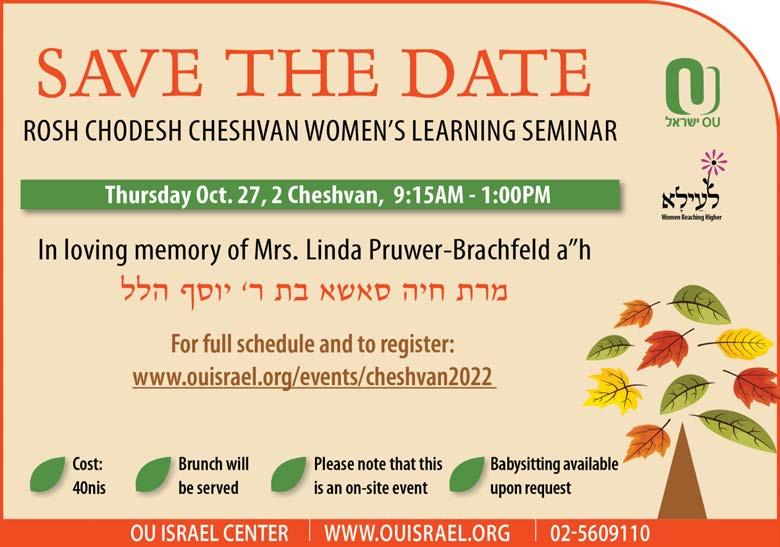

OU ISRAEL CENTER 49


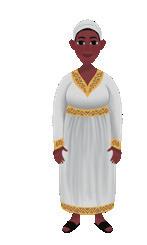








50 TORAH TIDBITS 1488 / BERESHIT 5783 לארשי ץראל עסמה לארשי ץראל עסמה















































































































































































































OU ISRAEL CENTER 51 THE ISRAELB ONLINE COMMUNITY Connecting you with fellow Jews, Israel & the Jewish People! n Install the new ISRAELB APP from the google play store to your phones (Dedicated in memory of Elchanan Yosef ben Chaim Eliezer) n Advertise on our new ISRAELB BUSINESS CENTER to gain exposure for your business n We can help you WRITE SPEECHES AND DIVREI TORAH for family events & Smachot n Use IsraelB to ORGANIZE, PROMOTE AND PUBLICIZE your events and Smachot n Use IsraelB to help you SELL OR RENT OUT YOUR PROPERTY CONTACT BENJY SINGER: benjysinger@israelb.org or 053-285-1526 Subscribe to our IsraelB newsletter, follow us on Twitter (@IsraelBayit) and join our Facebook Page & Groups. (Links on IsraelB.org) IsraelB is your resource for jobs, events, community news, shiurim and much more!
In His Image
Rav Nosson Zvi Finkel, zt’l, the Alter of Slabodka, was an educational pioneer and the primary figure responsible for implementing the Mussar revolution in the yeshivah world. He added to the yeshivah curriculum a formal seder, or study session, dedicated to the avoda of mussar character development and refinement of midos, with an emphasis on gadlus ha-adam, the latent potential of every per son. This addition reoriented the focus of yeshivos toward personal growth.
Rav Finkel’s contributions and legacy were so far reaching that Rav Elazar Shach went as far to say, “Most of the Torah study in the post-war world should be credited to the Alter.” Indeed, his top students established and led the yeshivos of Mir, Lakewood, Telz, Torah Vodaath, Chaim Berlin, and Ner Yisrael, among others.
The following anecdotes are found in the biographical work, HaSaba MiSlobodka.
In many yeshivos, the prevailing cus tom is for students to pass before their teachers after Friday Night davening to wish them a “Good Shabbos.” It was the Alter’s preferred way, however, to pass by the talmidim. Row by row and bench by bench, he would bless each and every individual with a hearty “Good Shabbos.”

On Shabbos morning, a group of eager
disciples would accompany him home from davening. As they passed by each home of the community, the Alter would call out, “May Hashem bless the Stein Family!” “May the Cohens be gebentched!”
While passing by the Rosh Yeshivah’s home, he would joyfully say, “Good Shab bos, dear Rosh Yeshivah!”
One week, the Rosh Yeshivah was away on a fundraising trip. Everyone knew this, yet as they passed by the home of the Rosh Yeshivah, the Alter called out with a boom ing voice, “Good Shabbos, heiligeh Rosh Yeshivah!” The confusion of the talmidim grew when they passed by the home of a local gentile constable. Though the win dows were shuttered and no horse was tied to the fence, the Alter called, “Good Morning Sir! Have a wonderful day!”
“Rebbi,” the talmidim pleaded, “there’s definitely no one home there…?” Reb Noson Tzvi smiled. “I’ve never understood why people feel they should only greet and bless others whom they see! Why not bless someone even when you don’t see him?”
The talmidim related that the holy Alter would sit by the window in his home and shower blessings and prayers on every passerby. More than once he was seen accompanying a Gypsy wagon as it left Slabodka, in respect for the travelers pass ing through town.
52 TORAH TIDBITS 1488 / BERESHIT 5783
Mashpiah, OU-NCSY Executive Director, Camp HASC Author of Baderech: Along the Path of Teshuva (Mosaica 2021)
RABBI JUDAH MISCHEL
…ּונֵתּומְדִּכ ּונֵמְלַצְּב םָדָא הֶׂשֲעַנ םי-ִהֹלֱא רֶמאֹּיַו
And God said: ‘Let Us make man in Our image, after Our likeness… And God created man in His own image, in the image of God He created him.” (1:26-7)
stature.
If we are aware of the tzelem and like ness of the Infinite God in others, there is no limit to how well we can treat them. Honoring a person is akin to honoring the Infinite One – no matter how much we honor them, it will never be enough!
Beloved is man for he was created in the image [of God]. Especially beloved is he, for it was made known to him that he had been created in the image [of God], as it is said: “for in the image of God He made man” (Avos 3:14)
When Chochmah u’Mussar, a collection of more than a thousand discourses and letters of his mentor and colleague, Reb Simcha Zissel Ziv, was about to be published, the Alter sighed deeply. “Oy… and what have I accomplished with my life? I have but one shmuess, a single discourse on the topic of Adam and the nature of man. Everything else I have ever said or done revolves around that one shmuess….”
This is the teaching, short and sweet, from Sefer Ohr Hatzafun, by the Alter of Slabodka:
Adam haRishon, Primordial Man, was formed by Hashem in His tzelem, image, and endowed with great spiritual poten tial. Following his sin and fall from grace, the lofty attributes of man began to degenerate, a process that has continued throughout the generations. Neverthe less, the tzelem Elokim remains intact in people, and they always have the ability to express this potential and regain their
The Sefas Emes tells us that the entire goal of the Torah’s laws and instructions for living is to uphold and honor the tzelem Elokim in human beings. And the remez or sacred hint for this is the fact that the word tzelem (ם''לצ) is an acronym for השמ ונל הוצ, “(That which) Moshe commanded us”.
As we begin the Torah reading cycle once again, may our commitment to this ‘single discourse’ drive every aspect of our lives and practice. םלצב ארבנש םדא ביבח. Beloved is man.

OU ISRAEL CENTER 53 אָרָּב םי-ִהֹלֱא םֶלֶצְּב ֹומְלַצְּב םָדָאָה-תֶא םי-ִהֹלֱא אָרְבִּיַו "…ֹותֹא
ארבנש ול תעדונ הרתי הבח .םלצב ארבנש םדא ביבח תא השע ם-יהלא םלצב יכ ,)ט תישארב( רמאנש ,םלצב .םדאה
BY RABBI SAM SHOR Program Director, OU Israel Center



ThisShabbat, we once again return to Sefer Bereshit and the familiar stories of the earliest generations of humanity, and in the weeks ahead, the life stories of our Avot and Imahot.
In the very first comment offered by Rashi on Chumash we read:
R’ Yitzchak said: The Torah which is the book of Law for the Jewish People should have commenced with the verse (Exodus 12:2) “This month shall be unto you the first of the months” which is the first mitzva given to the Jewish People. What is the reason, then, that it commences with the account of the Creation? Because of the thought expressed in the text (Psalms 111:6) “He declared to His people the strength of His works (i.e. He gave an account of the work of Creation), in order that He might give them the heritage of the nations.” For should the nations of the world say to Am Yisrael , “You are thieves, because you took by force the lands of the seven nations of Canaan”, the People of Israel may reply to them, “All
the earth belongs to the Holy One, blessed be He; He created it and gave it to whom He pleased. When He willed He gave it to them, and when He willed He took it from them and gave it to us” (Yalkut Shimoni).
Even today, more than eighty years later, the Rebbe’s insight continues to hold true
One of the great religious personalities of the pre-state Yishuv and early years of Medinat Yisrael, was the Ohalei Yaakov of Tel Aviv, Rabbi Yaakov Friedman, zt’l, the Admor of Husiyatin zy’a. The Rebbe of Husiyatin, was fortunate to make aliya from Poland, just ahead of the Nazi onslaught, settling in Tel Aviv in 1938, where he lived until his passing in 1954. Within the Reb be’s beautiful teachings we not only find depth and inspiration, but are often given a glimpse of this very challenging period in Jewish History.
54 TORAH TIDBITS 1488 / BERESHIT 5783
SIMCHAT SHMUEL
In the opening teaching recorded in the Sefer Ohalei Yaakov, the Rebbe asks an obvi ous question on this very first comment of Rashi.
And if the nations of the world do not value and believe in the Torah as the word of G-d, that what difference will the fact that the Torah begins with the story of our Avot and the promise Hashem made to them that the Land will be an eternal inheritance to their descendants, the Jewish People, come to make?
...Rather, the message is clearly intended as a source of chizuk for the Jewish People themselves! When the nations of the world turn toward us and declare, you have no legitimate claim to this land, we must have the confidence and fervent belief to know that indeed HaKadosh Baruch Hu did bequeath this sacred Land to us, that indeed despite the claims of the nations of the world, the Land of Israel does indeed belong to the Jewish People....

Though the Rebbe initially shared these thoughts in 1939, in the midst of the near decimation of the Jewish People, and the continuing struggle to build a future Jewish State in Eretz Yisrael; even today, more than eighty years later, the Rebbe’s insight continues to hold true. In these challenging
times, we have also witnessed incredible change as many nations, once determined to challenge the validity of our claim to our ancient homeland, have suddenly ini tiated diplomatic channels with Medinat Yisrael. When Am Yisrael is unflinching in our legitimate belief in our eternal connec tion to this sacred land as promised to us by HaShem Yitbarach,then indeed we can overcome any nation who makes claims to the contrary.
Yehi Ratzon, may each of us heed the Reb be’s words, and be blessed with the faith and confidence to clearly articulate that Am Yisrael is inextricably bound to Eretz Yisrael, through the eternal covenant that Hashem enacted with our illustrious Avot V’Imahot, and may we merit to continue to see this beautiful Land and her People blossom, prosper and thrive.
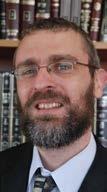
OU ISRAEL CENTER 55
Rabbi Immanuel Bernstein Zoom Parsha Shiur: https://zoom us/j/2135007524 EVERY MONDAY EVENING AT 8PM Discover a New Dimension in the Weekly Parsha ALL WELCOME
054-527-9356 DIRTY AIR, DAMP & MOLD GREEN TREATMENT EXPERTS - Corona Cleaning - Deodorization - Leak Detection Systems - Waterproofing - English + Hebrew Reports - Working at heights - Insured - Quality House Painting QUICK ESTIMATE/FREE ADVICE :)
BY RABBI MOSHE TARAGIN R am, Yeshivat Har Etzion
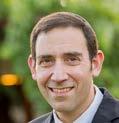
The First Battle for Yerushalayim
It was the first act of violence in history, and it launched a tragic legacy of bloodshed and murder. In a moment of rage Kayin slayed his brother Hevel in cold blood and, ever since, mankind has been victimized by the hideous crime of murder.
This first homicide in history was pro voked by a mysterious quarrel between two brothers. The Torah describes Kayin and Hevel having “words” in the field, but we aren’t informed of the topic of their dis pute. It must have been an explosive issue to elicit such a murderous response.
Rabbi Yehuda Halevi, the 12th century Spanish author of the Kuzari, fills in the blanks. The two brothers were arguing over land rights. As the only two children
alive, they each enjoyed unlimited real estate options, yet, they each coveted a particular parcel of land. They were vying for ownership of Har Habayit and Yerusha layim and this clash became bloody.
The bickering brothers innately sensed the surpassing value of this small moun tain. Unaware of the future religious import of this mountain, they still felt a primal draw to the site from which human his tory was launched. Man was created from dirt collected from the Temple Mount, and Kayin and Hevel were lured to the site of their father’s birthplace, and the birthplace of humanity. Though this “pull” was indeci pherable and could not be fully understood, it was powerful enough to kill for.
Kayin and Hevel were not the last “ancients”, to intuit the importance of this mountain. Thousands of years later, the first stirrings of religious consciousness sprouted upon this mountain. Even before Avraham discovered Hashem, a commu nity of morally sensitive people flocked to this locale, seeking to build an ethical city. They were guided by a king-priest named Malki Tzedek or the “king of justice”. These righteous people inhabited an otherwise dark and savage world, but they dreamed of a better state for humanity. They hoped to improve or even “perfect” the human condition, so they named this city Shalem or perfection. Their imaginations weren’t capable of conceiving “one” G-d, but they
56 TORAH TIDBITS 1488 / BERESHIT 5783 GEULAS YISRAEL
MAXI BoX 053-7272-815 ד״סב Storage Your place for extra space
Hats For Men And Women



DOROT RISHONIM
BenYehudah
did possess a shadowy sense that Man was placed on Earth for a higher “religious” or moral calling, and that this lifestyle could be best grasped by living near this mountain. Humanity was inching closer to religious maturity, and its moral imag ination was riveted to this mountain. The city of Shalem would eventually be trans formed by Avraham into Yerushalayim.
A generation later, a Philistine king named Avimelech also sensed this ‘draw”. He part nered with Avraham, struck a covenant, and gained a better understanding of Avraham’s G-d. As part of this partnership and the related land negotiations, Avimelech demanded that this city remain in the possession of his descendants for four generations.
As a consequence of these promises and guarantees, Yerushalayim was the last city in Israel to be settled by the Jews. Several
KING GEORGE
YEHUDAH
CAFÉ RIMON
DOROT
generations of the “Yevusi’’ tribe, Avimel ech’s descendants, occupied Yerushalayim and built heavy fortifications, obstructing Dovid Hamelech’s ability to take possession of the city. Even Avimelech, instinctively understood the importance of the city above which the G-d of Avraham resided.
Throughout the book of Breishit this small patch of land exerted a primal sway over generations of people who hadn’t yet discovered Hashem, but still had a vague notion that this land was the point of ori gin of humanity and the source of higher wisdom. This mountain magnetized the human imagination.
The Rise of Monotheism
Fast forward thousands of years later and humanity had advanced toward a more mature religious experience. The ancient world of paganism, black magic and
OU ISRAEL CENTER 57
BEN
3 off
02-563-7155 Web: SherlockSHats.com 3
RISHONIM
superstition gradually morphed into a world of science, reason, and rudimentary forms of monotheism. Humanity was gradually progressing toward a better understanding of Hashem and, unsurprisingly, it identified that the truths of monotheism ran through Yerushalayim. Worldwide religions such as Christianity and Islam were more successful at distilling monotheism, even though they still corrupted some of its core beliefs. Still, as humanity achieved a sharper concept of a one God, it became even more convinced that this small parcel of land provided access to divine knowledge and to supernat ural prophecy. What had begun as a vague notion had now evolved into a full-fledged conviction that Yerushalayim was the epi center of religion.
Sadly, for hundreds of years gruesome and deadly battles were waged in the con tinuing struggle to occupy this epicenter. Tragically, Jews were often caught in the crossfire of these bloody wars. The original quarrel between two brothers exploded into hundreds of years of carnage and bloodshed.
The Terminus
We have entered the final phase of his tory. Hashem’s chosen people have finally returned to this city, establishing it as the
capital of their renewed state in their ancient Homeland. Subconsciously, humanity is still haunted by a gnawing sense of the historical and religious importance of Yerushalayim. Humanity realizes that Yerushalayim will be the terminus of history and the site in which all nations gather to herald Hashem and to celebrate his chosen people.
The Midrash cites : םילשורי הדיתע

יבר רמא תוצראה לכל ןילופרטמ תושעהל – one day Yerusha layim will be the worldwide metropolis – and every other major city in the world will become Messianic suburbia.
Humanity realizes that Yerushalayim isn’t just the channel of religious inspiration but is also the historical terminus, and for this reason it shudders at the prospect of Jews returning to this city. Jews living in the North of Israel or along the coast doesn’t cause an international shudder. Jews living in Yerushalayim and the Biblical corridor of Judea and Samaria causes a worldwide shudder.
For some religions and nations, the shudder manifests as Messianic fervor. The children of G-d have returned to His city, and this portents an end-of-days scenario. For others the shudder manifests as militant opposition, as the land is too vital to cede to history. As in the past, the world subcon sciously realizes what is at stake upon this mountain and its surrounding regions.
Are You Surprised?
Politically, the aggressive opposition to Jewish presence in Yerushalayim is frus trating and the futile measures attempting to halt history are exhausting. However, when viewed through prophetic lenses we should expect no less than stiff opposition to our presence. This Land has been coveted
58 TORAH TIDBITS 1488 / BERESHIT 5783
ןנחוי
Rabbi Akiva Street, City CenterRabbi Akiva Street, City Center 9RM / 6BR / 340 SQM duplex Mohilever Street, German Colony 8RM / 4 BR / 220 SQM / 180 SQM garden Agron Street, Rehavia 4RM / 120 SQM / balcony Arnona 4RM / new Gilinski Real Estate Your realtor in Jerusalem Nadav 052 6984466 / Nahum 050 7225694
throughout the millennia and longing for this mountain is not about to end. In an odd way we are “pleased” that humanity con tinues to be drawn to this mountain. One day they will all assemble and acknowl edge the clear and unmistakable presence of Hashem. We should not expect them to lose interest in this mountain. The world is still broken, and their interest still expresses itself as opposition to our presence.
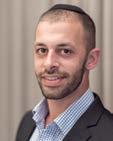



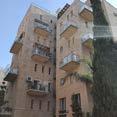

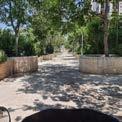
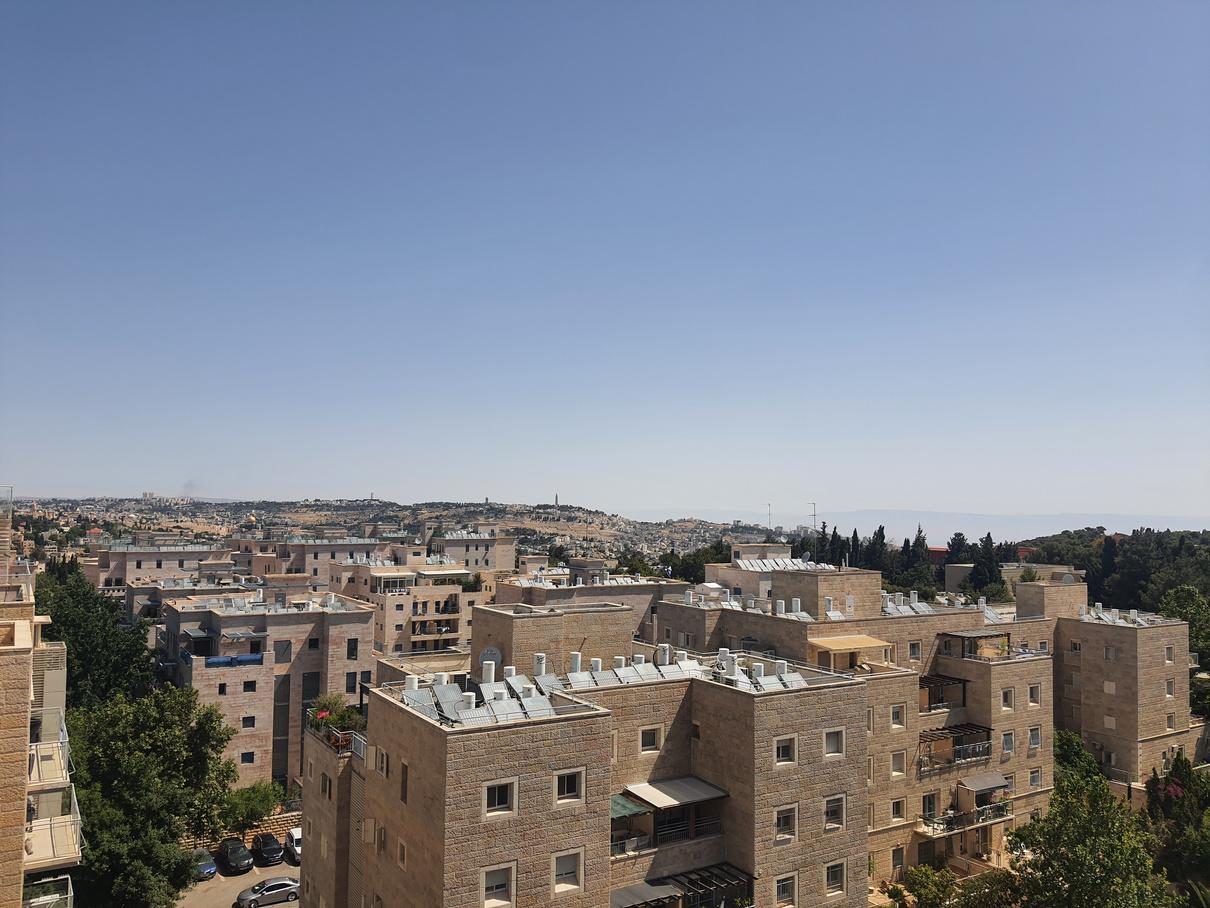

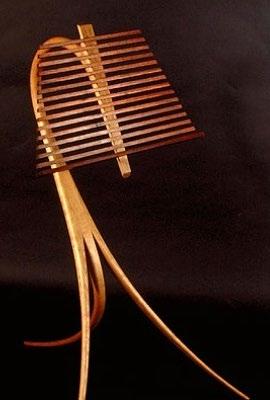
One day everything will align, and the clouds of confusion will be swept away by the overwhelming presence of Hashem. The world hasn’t abandoned its longing for this mountain and we are interested in their remaining interested. We just wish that their interest would not erupt with hostility. One day all the hostility will turn into acclaim and all the calumny into praise. They will never lose interest though. Good thing.

OU ISRAEL CENTER 59 SHTENDER MUSIC STAND ART Mark Levin Studio Exquisite Art Furniture Albuquerque, NM +1 (505) 490 9048 levinstudio@gmail.com www.marklevin.com Shipping Worldwide © Content copyright 2022, Mark Levin, Artist. All rights reserved
BUY YOUR DREAM PENTHOUSE ABOUT THE PROPERTY Unique penthouse apartment with panaramic views, lots of natural light, Located in the heart of Jerusalem, Arnona. The building has a Synagogue on the ground floor, which has daily services all year round. The building has a manager available on call for all your needs. Very friendly Anglo neighbours. Highly recommended option for a couple looking to retire in Jerusalem with a religious Anglo environment, good location, quiet, and beautiful views PRIMA LEVI 8 FEATURES 87 SQM Apt. 70 SQM Private roof 5 SQM Balcony off living room 2 Bedrooms 1.5 Bathrooms High ceilings Private parking Shabbat Elevator Asking price 3,475,000 NIS Call us to arrange a viewing 054-2074969 EXCLUSIVE Kaufman Realty Agent fee - 2% + VAT
DIVREI MENACHEM
BY MENACHEM PERSOFF Special Projects Consultant, OU Israel Center menpmp@gmail.com
In the Beginning –of What?
Once again, at this time, we commence reading the Torah – and our minds turn to the very first word, “Bereishit.”
Although the popular translation of this term is “In the beginning,” our commenta tors ask, the beginning of what?
So, let us share, along with Rabbi Wilfred Shuchat, an interpretation based on a Mid rash. In that Midrash, R. Hoshaya Rabbah opens with a seemingly irrelevant quota tion from Sefer Mishle, as follows: “I was by Him, as a nursling (AMON); and I was daily all delight” (Mishle 8:30).

The generally accepted understanding is that this verse refers to the Torah and that the Torah was in some way an AMON. Based on various sources, AMON is inter preted in the Midrash as an infant’s nurse, one clad in purple, something hidden or concealed, something greater than some thing else – and, finally, an artisan.
This brings us back to the question of the term Bereishit. If, indeed, Bereishit means “In the beginning,” the Hebrew should have been written as “Barishonah.” So how does the above-cited Midrash help us out?
The Midrash, taking up the last definition
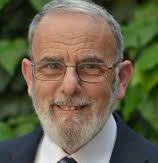
of AMON, views the Torah as Hashem’s helpmate or architect that He employed, as it were, to provide the design of the world He was about to create. Thus, the Torah preceded Creation and Hashem looked into it.
Indeed, the Midrash continues by indi cating that the term ‘beginning’ (Reishit) in the phrase “In the beginning, Hashem created” denotes the Torah. This notion is reinforced in the following passuk in the Book of Mishle: “The Lord created me [the Torah] as the beginning (Reishit) of His course” (Mishle 8:22).
Rabbi Shuchat posits that in creating the world, Hashem used the Torah as both a means and an end. In his words, the world is so constituted that the Torah is capa ble of being observed within it (“It is the perfect design”). Moreover, the Torah rep resents the purpose for which the world was created.
In that sense, Hashem is the Master Craftsman who uses the Torah for both its content and its form.
So, now, let us recraft that first sentence in the Torah to read: “With the Torah, God created the heavens and earth.” And let us also look into the Torah to fathom its secrets so that we, too, can contribute to shaping our world based on the only blueprint of creation worth consulting.
60 TORAH TIDBITS 1488 / BERESHIT 5783
Amazing stand alone homes in OLD KATAMON, TALBIYA, BAKA, GERMAN COLONY Call for more info





New apartment for sale in BAKA 113 sqm with terrace 6.8 sqm. Shabbat elevator 4,700,000 NIS










New penthouse OLD KATAMON. Underground parking & storage. 240 sqm on one floor. Large terrace & Shabbat elevator. 10,000,000 NIS


In the heart of BAKA enclosed in a magical courtyard: 3 bedrooms 2 full bathrooms one flight up. Beautiful spacious sukka terrace facing open gardens. Completely renovated with architectual design and high level finishes. Price 6,250,000 NIS
BAKA Penthouse. 154 sqm on one floor with 4 bedrooms and 2 full bathrooms. Shabbat elevator, 2 underground parking and 3 storage units!!! 25 sqm Sukka terrace off living room plus large roof top terrace. 6,650,000 NIS
Private home in BAKA. 650 sqm of land, private gated property, arab styled old house that was completely restored. Huge front garden. Building rights. Actual living space >450 sqm plus basement. Call me if you are looking for a special property.
OLD KATAMON stand alone home on a full dunam, 600 sqm living space plus 200 sqm building rights. Surrounded by a beautiful private garden. Parking and additional basement area. Call me for more info.

Wishing everyone a wonderful sweet year

OU ISRAEL CENTER 61OU ISRAEL CENTER 55 “TzviAir is a pleasure to work with and did an amazing job!” – Jamie Geller, Celebrity Chef AIR CONDITIONING SALES & SERVICE 02-628-8282 | tzviair.com in Alon Shevut XXL Free standing home 380 meters, 3 floors Great location, Surrounded by green Benjie Aziz Real Estate BENJIE 0544-882194 BENJIE@BEZEQINT.NET For Sale 054-723-3863 Jerusalem Real Estate is My Business Eta: 054-723-3863 Rachel: 052-546-6425 CALL TODAY
Eta Morris Realty, Ltd. etamorrisrealestate@gmail.com Eta: 054-723-3863 · Rachel: 052-546-6425 etamorrisrealty.co.il

62 TORAH TIDBITS 1488 / BERESHIT 5783 FOR FURTHER INFORMATION CONTACT US: REUVEN: 050-5231478 Hachim9@outlook.com THE MOST SOUGHT AFTER LOCATION IN OLD KATAMON In Jerusalem NOW SELLING PHASE 2





OU ISRAEL CENTER 63 YOUR REAL ESTATE AGENT IN JERUSALEM Purchase/Sell Debisraelhomes@gmail.com Whatsapp 0532852345 NEW WINTER LECTURE SERIES by RABBI BEREL WEIN 8 PERSONALITIES WHO HELPED BRING THE JEWISH PEOPLE HOME 8 SATURDAY NIGHTS AT 8:00 PM LIVE IN BEIT KNESSET HANASSI AND ALSO ON ZOOM ONLY by prior registration for the series & payment! From November 19-January 14 (except Chanukah ) 250 NIS for the entire Lecture Series. If you miss a lecture, the video link will be sent to you after the series is over. EARLY BIRD SPECIAL: Register by November 1, and the entire series video will be sent to you when it is completed! To register & questions, contact Nachum at nachum@jewishdestiny.com & registration forms will be emailed to you.



64 TORAH TIDBITS 1488 / BERESHIT 5783 Making or made Aliyah and you need help? - Teudat Zahut, Passport, Bank? - Car purchase assistance for the lowest monthly cost and highest resale value? - Insurance for home or car? - Real Estate purchases (agent-free)? - Personal, private assistance Daniel Cohen 054-698-2004 DANIEL@JFF.ORG.IL After successfully completing the financing for the Mekor Chaim project, Bemuna proudly presents "Bemuna ir Hamorriya" project! Fixed annual returns and low profit tax! Call our investment expert Moshe Ehrlich at: 072-395-1096, or email us at: Invest@bemuna.co.il or visit our website at: www.bemuna.co.il הנומאבריע הירומה A safe alternative for your investment funds! Bemuna has won the bid for the new Givvat hamatos project!












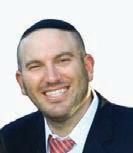








OU ISRAEL CENTER 65 Scan to visit our site www.noamhomes.com Real Estate | Investments | Management services www.noamhomes.com | office@noamhomes.com Look for us: NOAM HOMES Noam Homes Even Sapir 24, Jerusalem 058-793-2222 BS″D Scan to visit our site www.noamhomes.com Real Estate | Investments | Management services www.noamhomes.com | office@noamhomes.com Look for us: NOAM HOMES Noam Homes Even Sapir 24, Jerusalem 058-793-2222 2020 2021 From your friends at NOAM HOMES Real Estate Professionals The TOP 10 Real Estate Office in Jerusalem for 2020 & 2021 (MADLAN) HAPPY Passover NACHLAOT Property, devided into 3 units! Beautiful 5 duplex, built to a high standard! Lot with unique villa with Apartment Complex and private garden! Authentic 5.5 room Home with character and beauty! MALCHA NACHALAT ACHIM GERMAN COLONY Noam Homes BS″D RECENT ACTIVITY ON OUR LISTINGS 39 Mish'ol HaKramim St., Efrat 8 rooms | 180 sqm | Garden 100 sqm NIS 4,040,000 14 Aba Even St., Jerusalem 5.5 rooms | 144 sqm | 12 sqm balcony NIS 4,500,000 21 Yahalom St., Mitzpe Yericho 5 bedrooms | 3 full bathrooms | 253 sqm NIS 2,900,000 45 Mitspe St., Jerusalem Private house | 6 rooms NIS 4,800,000 LOOKING TO BUY/SELL A PROPERTY IN ISRAEL? We will help you! NOAM HOMES is a boutique real estate agency. The firm was established by Noam Vasl, a senior real estate consultant with expertise and extensive experience in marketing, managing, and selling real estate in Jerusalem and the surrounding areas. Noam Homes is taking its exclusive properties abroad! Noam Vasl Owner & Real Estate Agent +972-52-848-7391 Noa Vasl Real Estate Agent +972-52-870-2387 NEW YORK Sun, Nov 13 2022 Brooklyn, NY NEW JERSEY Tues, Nov 15 2022 Teaneck, NJ MIAMI Sun, Nov 20 2022 Aventura, FL MEXICO Wed, Nov 22 2022 Mexico City Book a meeting TODAY to see how we can assist you in the process of selling your home to the right buyers at the right price: Scan to visit our site www.noamhomes.com Real Estate | Investments | Management services www.noamhomes.com | office@noamhomes.com Look for us: NOAM HOMES Noam Homes Even Sapir 24, Jerusalem 058-793-2222 BS″D Scan to visit our site www.noamhomes.com Real Estate | Investments | Management services www.noamhomes.com | office@noamhomes.com Look for us: NOAM HOMES Noam Homes Even Sapir 24, Jerusalem 058-793-2222 2020 2021 From your friends at NOAM HOMES Real Estate Professionals The TOP 10 Real Estate Office in Jerusalem for 2020 & 2021 (MADLAN) HAPPY Passover NACHLAOT Property, devided into 3 units! Beautiful 5 duplex, built to a high standard! Lot with unique villa with Apartment Complex and private garden! Authentic 5.5 room Home with character and beauty! MALCHA NACHALAT ACHIM GERMAN COLONY Noam Homes BS″D RECENT ACTIVITY ON OUR LISTINGS 39 Mish'ol HaKramim St., Efrat 8 rooms | 180 sqm | Garden 100 sqm NIS 4,040,000 SOLD 14 Aba Even St., Jerusalem 5.5 rooms | 144 sqm | 12 sqm balcony NIS 4,500,000 SOLD 21 Yahalom St., Mitzpe Yericho 5 bedrooms | 3 full bathrooms | 253 sqm NIS 2,900,000 SOLD 45 Mitspe St., Jerusalem Private house | 6 rooms NIS 4,800,000 SOLD LOOKING TO BUY/SELL A PROPERTY IN ISRAEL? We will help you! NOAM HOMES is a boutique real estate agency. The firm was established by Noam Vasl, a senior real estate consultant with expertise and extensive experience in marketing, managing, and selling real estate in Jerusalem and the surrounding areas. Noam Homes is taking its exclusive properties abroad! Noam Vasl Owner & Real Estate Agent +972-52-848-7391 Noa Vasl Real Estate Agent +972-52-870-2387 NEW YORK Sun, Nov 13 2022 Brooklyn, NY NEW JERSEY Tues, Nov 15 2022 Teaneck, NJ MIAMI Sun, Nov 20 2022 Aventura, FL MEXICO Wed, Nov 22 2022 Mexico City Book a meeting TODAY to see how we can assist you in the process of selling your home to the right buyers at the right price:
FROM THE VIRTUAL DESK OF THE OU VEBBE REBBE
RAV DANIEL MANN

Going To And From An Aliya
Question: Can you explain the details of how one should walk to an aliya and how and when he should return?
Answer: There are no direct Talmudic sources on this matter, but Rishonim and Acharonim apply general principles and parallel sources.
The Terumat Hadeshen (II:119) says that (assuming there are two openings to the bima) one should go up through the one closer to him. He mentions a Talmu dic source that describes that procedure regarding entering the complex of the Beit Hamikdash, but later authorities (includ ing the Gra, Orach Chayim 141:7) found no such source. The Gra prefers an approach that puts a premium on going to the right rather than the shorter path. This has sources in Chazal, as a kohen who goes up to the mizbe’ach normally turns right first even if it is longer (Yoma 45a) as does one who enters the Beit Hamikdash courtyard (Midot 2:2). The Chatam Sofer (Shut Orach Chayim 187) claims that even the Terumat Hadeshen believed in going to the right, just that he would position himself so that the closer way would be to the right. In any case, the Shulchan Aruch (OC 141:7) rules that going to the closer “opening” to the
bima is the first priority, and only when they are equivalent should one go to the right side. The Mishna Berura does not cite those who argue, and this is accepted practice.

The Mishna Berura (141:22) cites two rea sons for going the shorter way: 1. Honor of the community warrants the shortest wait possible for the oleh. 2. To show respect for the (sefer) Torah, by going to read it as directly as possible (brisk walking also honors, running does not – Mishna Berura 141:25). There are different potential nafka minot: 1. On Shabbat, due to Mi Shebeirach for the olim, there is plenty of time to get to the bima, but getting there quickly still honors the Torah. Possibly, going to the right would then be better than the shorter route, although this is apparently not the minhag. 2. Whether it is permitted to walk the longer distance more quickly (Torah Lishma 57 cites precedent for the shorter path being a real advantage even when it is not done more quickly).
It is unclear whether in calculating the short path, we should consider the fact that the oleh stands right of center of the bima and if coming from the left, he may have to maneuver around the ba’al korei. The language of the Shulchan Aruch implies that the distance from the bima is the deter minant, and that seems correct regarding the element of honor. In rooms where the bima has no partitions and thus openings,
66 TORAH TIDBITS 1488 / BERESHIT 5783
The Orthodox Union - via its website - fields questions of all types in areas of kashrut, Jewish law and values. Some of them are answered by Eretz Hemdah, the Institute for Advanced Jewish Studies, Jerusalem, headed by Rav Yosef Carmel and Rav Moshe Ehrenreich, founded by HaRav Shaul Yisraeli zt”l, to prepare rabbanim and dayanim to serve the National Religious community in Israel and abroad. Ask the Rabbi is a joint venture of the OU, Yerushalayim Network, Eretz Hemdah... and OU Israel’s Torah Tidbits.

a beeline to the place the oleh will stand seems ideal.
Chayei Halevi (I:18) points out that the minhag is that the chazan approach ing the bima with the sefer Torah always goes to the right. He explains that this is correct because the tzibbur is not waiting for an individual, the chazan is not going to (but with) the Torah, and because the bima is almost always in the middle (mak ing the right side the “tiebreaker”), we are consistent.
After finishing the aliya, there are two reasons to prefer taking the opposite side (Shulchan Aruch ibid. and Mishna Berura 25). Going the long way shows “reluctance” to leave, and there is a precedent for leaving holy places from a different side than one came in (see Yechezkel 46:9).
As far as timing, Sephardim leave the bima after the ending beracha, but Ashke nazim wait longer. The Rama (OC 141:7) states that it is until after the next oleh makes it to the bima, so as not to leave the sefer Torah “unattended.” The Mishna Berura reports on our minhag to wait after the next aliya so that one not miss some of the laining while walking back to his place. Based on the reasoning, it makes sense to leave before the next oleh’s con cluding beracha, as hearing the beracha is both easier to follow and less important for the individual than the laining. How ever, the Chayei Adam (I, 31:10) implies
that it is better to wait until after the bera cha to hear it properly. It also seems that people like to wait to wish Yasher Koach to the next oleh, and it is hard to argue with good manners.
Having a dispute?
For a Din Torah in English or Hebrew contact ‘Eretz Hemdah - Gazit’ Rabbinical Court: 077215-8-215 • fax: (02) 537-9626 beitdin@eretzhemdah.org

077-2050015 052-2678749 www.golan-realestate.net

Meir Golan
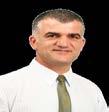
Old Katamon: 4 room apartment in a small and quiet street, 101 sqm, renovated, very bright and airy, master bedroom, Safe room (mamad), sukkah balcony, view, elevator, 3,400,000 NIS
Old Katamon: 4 room apartment, 90 sqm, well split, bright, airy, sukkah balcony facing a magnificent panoramic view, 3 exp Shabbat elevator, parking, 3,290,000 NIS
Sharei Chesed: 5 room apartment, 120m, master suite, mamad, Suka balcony, open view, Shabbat elevator, fully accessible, private parking, storage 5,350,000 NIS
Old Katamon: Spacious 3 room apartment in a very quiet street, 75 sqm, sukkah balcony facing a green and pastoral view, 3 exp. Shabbat elevator, private parking, storeroom, 2,690,000 NIS
Baka: 5-room garden apartment, 120m, master suite, private parking, storage, full of light, airy 5,250,000 NIS
Baka: 5-room apartment, 130m, balcony, Shabbat elevator, huge storage, private parking 5,100,000 NIS
The Greek Colony: 4-room apartment, 85m, balcony, green open view, elevator, great location, needs renovation 3,200,000 NIS
Old Katamon: 4-room apartment, 95m, balcony, open view, Shabbat elevator, fully accessible, private parking, 3,290,000 NIS
Arnona: 4 room brand new apartment, 90m, master suite, nice Sukkah balcony and small garden, fully accessible, 3,100,000 Nis
The Greek Colony: charming 3-room apartment on "Dmei Mafteach" full of light and good energy, 74m, high ceilings, balcony, 1,400,000 NIS
OU ISRAEL CENTER 67
Meir Golan
Editor, Torah Tidbits
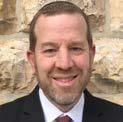
Growth Rings of the Fruit Tree
Who was first to sin in the Book of Gen esis? Long before Adam and Chava ate the forbidden fruit, it turns out that the earth itself rebelled against God. In a perplexing teaching, the Sages relate that originally the entirety of a fruit tree was supposed to bear the very same taste as its fruit. For example, the bark or wood of an apple tree was intended to taste like apples. But the contumacious trees resisted God’s design, and so we find that the only palatable part of the tree is the fruit.[1]
Rav Avraham Yitzchak
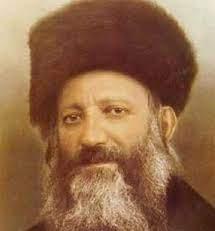
Hakohen Kook read this mysterious Midrash symbol ically: the tree represents the means or process, and the fruit, the end or product.[2] In this imperfect world, we often give our greatest appreciation to the gratifying or delectable accomplishment, while failing to duly recognize the growth and toil that gave rise to it. The student who attains the highest grades receives our vocal admira tion; the one who diligently studies and makes significant strides is acknowledged
with muted, sporadic applause. We vener ate results but often overlook the requisite discipline, the hard work, and the slow, sometimes imperceptible, growth, required to yield them.
What is true of our perception of others is true of our self-perception as well. We often neglect our incremental accomplishments and fail to enjoy what should be satisfying achievements. We are convinced that joy will only come when and if our ultimate goals are attained. Sadly, as our boughs flourish and reach out to meet our life goals, we expectantly, almost single-mind edly, await the delicious fruit instead of making laurels from our impressively sus tained growth.
This is the unfortunate plight of man, the “sin” of the tree that fails to make its constantly expanding growth rings as savory as its ripest seasonal produce. But Rav Kook’s interpretation boldly teaches that we harbor the potential to overcome this deficiency. The sure remedy is to respect the tortoise as much as the hare. It is to recognize how the elastic present encom passes all of the past tough growth. With this, where we are presently in life is not only palatable but worth savoring.
[1] Rashi on Genesis 1:11, s.v. ירפ ץע.
[2] Orot ha-Teshuvah, 6:7.
68 TORAH TIDBITS 1488 / BERESHIT 5783
RABBI AARON GOLDSCHEIDER


OU ISRAEL CENTER 69 WHEN AT RISK BETWEEN LIFE
AND
DEATH, AN EPI-PEN CAN MAKE ALL THE DIFFERENCE. HATZALAH UNITED HATZALAH UNITED HATZALAH UNITED HATZALAH UNITED HATZALAH UNITED HATZALAH CAN I BORROW YOUR PEN? VISIT TODAY! HTTPS://ISRAELRESCUE.ORG/EPIPEN UNITED HATZALAH VOLUNTEERS NEED YOUR HELP TO KEEP THEM IN SUPPLY.
PARENTING COLUMN
Teaching Gratitude
Dr. Ethan Eisen, PhD

Imagine in your mind a recent encounter with some who seemed ungrateful. Now pause for a moment and notice your facial expression—what is your expression? My guess is that you are expressing something between pain and disgust on your face. For many parents I have spoken with, raising an ungrateful child is one of their greatest worries. “I just want my child to be appreciative” or “I don’t want my child to be spoiled” are common sentiments that parents express. So what is gratitude, and how do we teach this important characteristic to our children?
Many scholars have offered definitions of gratitude, and one of them stands out as my preferred way of understanding the
NACHI REALTY 054-461-3943

In a recently finished tama 38 building in Baka close to Emek Refaim. 4 rooms. good shape 2.99m shekel
Great Investment! 2 rooms in new building under construction in a Great location, only 1.69m shekel, 3 and 4 rooms also available
concept: “Gratitude, as a response to a gift, is also a form of generosity, of graciously crediting the other for something that was not strictly owed.” The phrase “that was not strictly owed” is important, because a person can credit acknowledge that he received something from another person and still express a sense of entitlement for what was given to him (think Willy Wonka’s Veruca Salt character). But this definition also lacks an important distinction: there is the feeling of gratitude, and the expression of gratitude, which are not the same thing.
Parents often find it relatively easy to get their child to express gratitude: “Say thank you to your friend for the birthday present!” Getting into the habit of saying “thank you” is important, and expressing appreciation of another person fosters long-lasting friend ship and a stronger community.
Nevertheless, many parents also want to know that their children feel grateful, which is a more difficult parenting goal to achieve. In addition to the general challenge of train ing a child to have a certain attitude, another concern parents face is the thought that if the child feels undeserving, that may lead to feeling shame or worthlessness. On the other hand, we do not want our children to feel so deserving and entitled that they develop expectations of other people’s ser vice. As such, effectively teaching gratitude, like many other aspects of life, is a balance between two apparently opposite extreme
70 TORAH TIDBITS 1488 / BERESHIT 5783
OU ISRAEL
and unwanted attitudes: entitlement on the one side, and low self-worth on the other. Reflecting on our own personal models for gratitude—such as family members, mentors, or close friends—can provide clues about how we can guide our kids to emulate their actions and attitudes. What is a common thread between those who seem to embody this characteristic? Having more stuff is not intrinsically tied to feeling more grateful, as people who are wealthy or impoverished can exhibit both sides of this trait. Instead, in my experience, people who engage in service of others, while also main taining appropriate boundaries to account for their own needs, tend to be the ones who seem to me to be the most grateful.
While there are many techniques that can foster a sense of gratitude, I want to focus on two types of parenting strategies related to balancing the service of others and per sonal boundaries. The first involves finding opportunities for our child to help others, as well as witness the parent helping oth ers, even in small ways, such as: gathering siddurim after shul; cleaning up a camp site; returning the shopping cart; treating a service provider respectfully; explaining mitzvot that are based in gratitude; or any number of other small actions that show that the needs of others are a priority.
The second involves conversations about this topic. Sharing with your child your way of thinking can help him develop a healthy balance, as he often looks to you to under stand how you balance different pressures. How do you decide when you are entitled to look out for yourself, and when you think helping others is proper? What are things that you are grateful for, and how do you
demonstrate that? Are there areas that you fall short in appreciating things that you have? Are there areas that you feel proud of in how you express appreciation?
There are no fool-proof ways to ensure our children will truly feel grateful, and it is not entirely clear why helping others seems to foster this attitude. Nevertheless, doing our best to instill a sense of gratitude will be a lifelong benefit to our child.
Dr. Ethan Eisen, PhD is a Licensed Clinical Psychologist (Israel and U.S.) offering Evi dence-Based Solutions for Individuals and Couples
Feel free to send in any parenting questions you may have to parenting@ouisrael.org (Details will be changed to preserve anonymity).
ONE DUBNOV, TALBIYEH




OU ISRAEL CENTER 71
T : +972-2-567-0303 E: info@prosperity-realestate.com prosperity-realestate.com • 12 apartments in each building (24 apartments total) • Stunning architectural design • Extended outdoor space for each apartment • A spacious luxurious lobby of 350 sqm with a doorman 24/7 • High-end technical specifications. • The common area will include landscaped garden decorated with sculptures Exclusive marketing by Prospeity Real Estate Only8 apartments left!
is reluctant to send Yishmael away and Yitzchak seeks reconciliation with Yish mael and seeks to bless Esav.
6th Aliya (25:1-11) Avraham mar ries Keturah; they have 6 sons. All that Avraham has goes to Yitzchak; these are sent eastward with gifts. Avraham dies at age 175; he is buried by Yitzchak and Yishmael in Ma’arat Hamachpelah. Yitzchak is blessed by G-d: he lives in Beer L’chai Roi.
 TORAH VEHA'ARETZ INSTITUTE BY RABBI MOSHE BLOOM en.toraland.org.il
TORAH VEHA'ARETZ INSTITUTE BY RABBI MOSHE BLOOM en.toraland.org.il

is to emphasize that the Torah is not as interested in the history of power as in the history of the covenant of G-d with the Jewish people. And that will be told at great length.

HAFTORAH CHAYEI SARAH
1 KINGS 1: 1-31
Agricultural Activities and Hefker In My Garden During The 8th Year
The transition from Avraham to Yitzchak is complete. While G-d has been a silent partner in this parsha, here He completes the generational transfer – He blesses Yitzchak. The Jewish people will be Yitzchak and not Yishmael.
The theme of this week’s haftorah echoes the theme in our parsha which men tions both the death of Sarah and Avraham.
King David was an older man and a woman was assigned to him to serve him and provide warmth.
7th Aliya (25:12-18) The genera tions of Yishmael are enumerated. Yishmael dies. His descendants dwell from Egypt to Assyria.
Yishmael’s story is brief. He has numer ous and powerful offspring. The brevity

A SHORT VORT
The prohibition to perform agricultural activities on behave of shemitah produce also applies during the eighth year. It is for bidden to such activities to encourage the growth of shemitah produce (avruyei liana), only if they are done in the fruit itself; if done around the fruit or in the tree – they are allowed, for example: removing thorns, fertilizing the spraying and more (Torat Kohanim Behar, 1:4; Mishnah Shevi’it 2:5). It is permitted to perform actions to protect the fruit, even if done in the fruit itself.
During the eighth year it is permissible to perform any agricultural activity on behalf of the trees, even if the (shemitah) fruit will benefit from them as well. This includes melachot that enhance the tree - avruyei liana, and not only to maintain and keep it alive - ukmei liana.
Adoniyahu, one of King David’s sons, began to prepare for ascension to his father’s throne. This was despite the fact that King David expressed his wishes that his son Shlomo succeed him.
Adoniyahu convinces two very signif icant personalities - the High Priest and the commander of King David’s armies - to
BY RABBI CHANOCH YERES Rav, Beit Knesset Beit Yisrael, Yemin Moshe
When Avraham addresses the people of Cheit, trying to acquire a burial spot for his wife, he says “Ger V’Toshav Anochi Eimachem” (23:4) “A Stranger and a Resident am I with you”
This seems to be a contradiction. If one is a stranger than he is not a resident, if he is a resident than he is no longer a stranger. What did Avraham mean?
(Hilchot Shemitah 7:18) that this means during the eighth year, when can the poor still enter orchards to gather shemitah fruit. Rivmatz (Rabbi Yitzchak ben Malkitzedek) writes that after the second rainfall, the entrance of the poor will be harmful to the field, so it is permitted to prevent them from entering. We see that shemitah produce is owner less, and it is forbidden to prevent people from going into one’s garden or orchard to pick the fruit. This permission of entrance applies also during the eighth year until the second rainfall, which falls out between 23 Heshvan and Rosh Chodesh Kislev.
The Magid of Dubno (Jacob ben Wolf Kranz 1741-1804) explains that Avraham watched how he spoke in this tense situation in order to, both, state his truth and be able to keep the peace -Shalom Bayit. Avraham said, on the one hand, “I am a Resident’ due to G-d’s promise to receive this Land and on the other hand, I still need your agreement to purchase a plot. In other words, Avraham implied “I am the resident” and you are the “strangers”, while they understood him as saying that “they” are the residents and Avraham is the stranger.
The Mishnah (Shevi’it 9:7) states: “Until when can the poor enter orchards? Until the first rainfall.” Rambam explains
The peace was kept, and Avraham remained true to his ideals.
Shabbat Shalom
After Rosh Chodesh Kislev, it is permissible to lock the fence and perform the mitzvah of hefker by bringing the fruit outside of the fence. The owner needs to take out the fruits because they still have sanctity and are hala chically considered hefker.
72 TORAH TIDBITS 1488 / BERESHIT 5783
12 TORAH TIDBITS 1440 / CHAYEI SARA 5782
We are a young senior couple looking for a 1 bedroom furnished apartment in Jerusalem from December 2021-June 2022 0524419731










OU ISRAEL CENTER 73 IL - 00972-54-2074969 USA +1-9143364362 | UK +44-2037697387 yoel@kaufmanrlty.com | kaufmanrlty.com Kaufman Realty Was born out of the desire to provide a quality, worry-free solution to those who have chosen to invest in Israel but find themselves outside of the country for long periods. Jewish Quarter XL Duplex apartment135 meters 3 bedroom, 2 bath, new kitchen 5 minutes from Hurva square! Benjie Aziz Real Estate BENJIE 0544-882194 BENJIE@BEZEQINT.NET For Sale
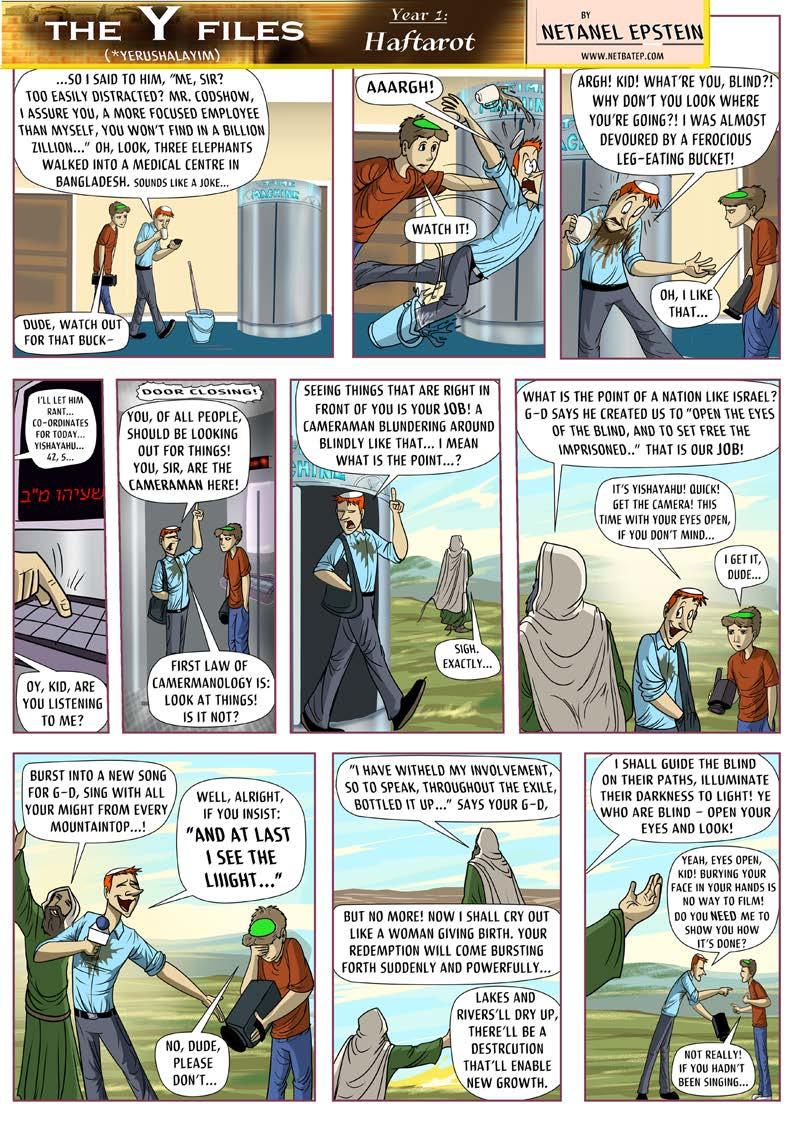
74 TORAH TIDBITS 1488 / BERESHIT 5783

OU ISRAEL CENTER 75
TORAH 4 TEENS
BY TEENS NCSY ISRAEL


Moriah Goldsmith Raanana Chapter Director
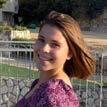
A Little Effort Goes a Long Way
In Parashat Bereshit perek dalet we get to know the first set of brothers in the Torah.
Cain the older brother and Abel the younger one. When it came time for them both to bring a present to Hashem, Cain chose to bring from the fruit of the earth and Abel chose to bring from the animals. Hashem then happily accepts Abel’s gifts with open arms while Canes’ gift gets rejected. The question is why did Cain’s gift get rejected? Cain knows that everything in this world Hashem made kadosh and when he brought fruit he didn’t differen tiate between good fruit or bad fruit, they were all holy! But Abel knew that although everything is kadosh, Hashem wants to see our effort, so he went out of his way to pick the best aged sheep he had. Abel took the extra step to show Hashem his greatest appreciation.
Correction:
Last week's edition mistakenly had the wrong pictures of the NCSY divrei Torah. We apologize. Here are the correct pictures with their names.
This idea can give us a new perspective on the year. We can either be like Cain and accept that Hashem loves us and we don’t need to do anything else, or we can be like Abel and push ourselves beyond that basic understanding and show Hashem how grateful we are for all of his wonderful gifts.
Shabbat Shalom and Shana Tova!
Zach Tobin 12th Grade, Raanana Perfect is the Yetzer Hara
In parshat Bereishit Hashem created the whole world. When he was done creating, the Torah tells us that Hashem looked at everything he created and it was all tov meod. Most of the other days of creation Hashem looked at what he did and said it was tov, how come at the end of the sixth day he said it was tov meod?
The Midrash Rabbah tells us that when the Torah says the word tov it is the yetzer hatov, and when it says tov meod it is the
Ariel Werblowsky New Modiin Chapter Director!



76 TORAH TIDBITS 1488 / BERESHIT 5783
Noa Anders
yetzer hara. How can that be? If tov is the yetzer hatov then tov meod should be something even more! Not the yetzer hara?

This question was answered by the Dubna Maggid who said that when look ing at something beautiful or something great you may think that it is perfect, but that is your yetzer hara speaking since there is nothing perfect in this world other than Hashem! But, if you look at it properly you will see that it is in fact a good thing, something that you can use in your avodat Hashem or something to help other people with etc.
The same goes for our qualities, if we think we are perfect then this coming year we will not improve, we’ll never make any progress. But, if we see that we are good with room for improvement, step by step we can become closer with Hashem and better people.
Shabbat shalom.

OU ISRAEL CENTER 77
NCSY Israel is the premier organization in Israel, dedicated to connect, inspire, empower teen olim to the Land of Israel by encouraging pas sionate Judaism through Torah and Tradition. Find out more at israel.ncsy.org Call +972507874049; email charless@ekmd.huji.ac.il SpaciouS cottage Quiet walkway off the street, 246 meters, 3 floors, 12 rooms, 6 bedrooms, 4 bathrooms, 2 gardens, parking spot, roof. Price NIS 8.5 million No agents GIvat OraNIm





78 TORAH TIDBITS 1488 / BERESHIT 5783



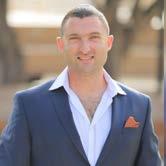







Large 1 bedroom 60 sqm 90 sqm private garden Private parking Storage (small) Shabbat elevator Occupancy: November FOR RENT: Apartment In Baka Best Listings in and around Jerusalem Yitzchak Kowalsky Cottage in Rimon, Efrat 290 sqm, Private entrance Ground level: Kitchen, dining room, living room, den + guest bathroom + exit/entrance to a nice front yard 1st level: 3 bedrooms includes en suite + full bath 2nd level: 2 more bedrooms + full bath Option for separate unit 054-766-0338 Yitzchak@yykrealestate.com www.yykrealestate.com New Project on Mekor Haim FOR RENT: Lovely Garden Apartment in Rechavia 100 SMQ 2 bedroom and 2 bathrooms Private entrance (only 4 steps) Private garden Renovated and fully furnished Efrat 3 Bdrms- 88 sqm with balcony 4 Bdrms- 170 sqm+13 sqm balcony PH- 147 sqm + 114 sqm terrace All include high end specs Great prices and payment plans Occupancy: 03/2025 לייא תולבוה ד״סב www.premiummoving.co.il MovingPackingStorage 053-7272-815 Your trusted corporation for purchasing privately registered land in Israel at the lowest prices Moshe Keinan mk0522867038@gmail.com 03-5774277/052-2867038 ד"סב Land Inheritance Company Ltd. מ"עב ץראה תשורי תרבח Starting at $ 40,000 per dunam










 Rabbi Avi Berman Executive Director, OU Israel aberman@ouisrael.org
Rabbi Avi Berman Executive Director, OU Israel aberman@ouisrael.org


























































































































































































































































































 TORAH VEHA'ARETZ INSTITUTE BY RABBI MOSHE BLOOM en.toraland.org.il
TORAH VEHA'ARETZ INSTITUTE BY RABBI MOSHE BLOOM en.toraland.org.il





































